#protagonist power-up privileges
Text
Which series does Protagonist Power-Up Privileges right?
Protagonist Power-Up Privileges is when the protagonist gets the special powers that no one else does. Sometimes this can even be a group of protagonists.
I mean most of the time anime just makes the MC super OP compared to everyone else.
We've got Dragon Ball with Goku and all his Saiyan transformations/zenkai boosts make everyone not named Vegeta or Gohan look like nothing.
Ichigo and Naruto have their BS bloodlines and while I am not too familiar with Bleach at least Naruto has an equal in Sasuke
One series I look to for the most part for this trope is Digimon, because the Digivolution levels of the partner Digimon are a clear sign of power-up favoritism.
Digimon Adventure has only MC and Rival/Lancer (Tai and Matt) get Mega Level until Tri years later
Digimon Adventure 02 has the MC and Rival/Lancer/6th Ranger (Davis and Ken) get two fusion evolutions in the form of Imperialdramon's 2 modes
Digimon Tamers has 3 main leads throughout and an extra 4th ranger all get Mega Evolutions with Takato/Guilmon only getting Gallant Mon Crimson Mode in the last fight. The 3-4 other Tamers/side Digimon don't matter except for Impmon/Beelzemon
Digimon Frontier does this the worst because Takuya and Koji get their big evolutions which require everyone else to lose the ability to fight.
Digimon Data Squad is similar to Tamers, 3 MCs and a 4th Ranger with the protag gaining a new form in the last fight (although Crimson Mode is cooler than the Agumon Burst Mode IMO)
Digimon Xros Wars/Fusion can be pretty bad since in the first half only Taiki/Mikey has the Xros/Fusion Loader and the other 2 are reduced to sidekicks/moral support most of the time. When we get over to the 2nd half with the Death/Dark Generals and we get the other 2 Loader carriers only Kiriha/Christopher gets an evolution while Nene gets none, which is more noticeable when they only get one Digivolution instead of a line in this series.
Hunters has the single digivolutions be more like battle modes which kind of makes it not matter as much although Arresterdramon did get Superior Mode and the Xros Up mode with the Brave Snatcher
Appmon is similar to Tamers and Data Squad, say it with me: 3 MCs and a 4th Ranger. Although the MC doesn't;t get a new super form in the final fight. Yeah, there are a bunch of side characters too but they didn't have digivices already like Data Squad or get them passed out like hot cakes like in Tamers.
Ghost Game I haven't been following lately but it seems like it might be following the Tamers/Data Squad/Appmon format and we just haven't met the 4th ranger yet.
So tell me, what series do you think does the best and worst with this trope, giving your protagonists their big hero power-ups and leaving everyone else in the dust?
1 note
·
View note
Text
Avoiding the white savior of the kingdom
@ceo-of-angst asked:
Okay so I'm writing a fantasy series. There's two main kingdoms though there is a third but that one doesn't have to do anything with this ask. Both of them are likely as big as a continent each so there are different climates everywhere, therefore there's a lot of diversity even within one country. The issues mostly is between the two kingdoms nationality wise, as there's a war.
The prince of one of the kingdoms kills his older brother to gain the throne. This is where the issue starts. They have a younger (half)sister who ends up leading a revolution bc of her brother's bad rule (famine, war, dictatorship and incantation or sentence to fight to the death in war to anyone who doesn't obbey the government etc), she's white, she's helped by my main cast who are all poc (one of them also from nobility) from the other kingdom and I don't want to accidently make it a white savior
She's not my main character though if anything we only see into her pov bc of a difference between kingdoms in book 2. Most of the pov is on my main cast so I don't know how this could pay out.
Add diversity to the kingdom
There is a simple solution: don’t make one kingdom all-white or all-BIPOC. Add in diversity and mixed race. You seem to already be doing that, and it’s not an issue of race but rather tyranny. White saviorism is when only a white character can solve a problem for BIPOC and they’re seen as the hero. If it’s a team effort, where your protagonist is fallible but well-intentioned, you should be fine.
-Jaya
Questions to ask yourself
This critique got levied at Tamora Pierce’s Trickster series, and it’s a pretty valid critique of the books—every time you have a white person as a figurehead of an otherwise-diverse movement, you’re going to start getting into why this white person, and why then?
It’s especially salient if you have the person come into an already-established rebellion movement. Is her involvement the thing that gets the privilege necessary to make the movement valid? What about her makes her the ideal top person in the organization?
Why is she white?
My first question is: why is she white? Is it related to colorism and classism? If yes, then why are you automatically making the leading group white if there’s so much diversity and so many other groups can trend extremely pale?
Why are the kingdoms so big?
My second question is: why are the kingdoms so big? It’s actually frighteningly hard to run a continent-sized country. If you’re attempting to make these single groups so big simply for ease of worldbuilding, and for diversity’s sake, know that a country does not have to be large to contain a multitude of groups. You are allowed to have political rivalry in a small area and still maintain diversity within it.
How much privilege is she willing to give up?
My third question is: how much privilege is she willing to give up? Is she trying to take the throne for herself, or is she trying to destroy all of the structures that gave her status in the first place? Because that question will determine how willing the PoC around her are going to be. Why would they support a ruler if they’ve been subjugated by that family, with no real promise she’s going to be any different once she gets in power?
On the flipside, why would she be willing to give up any of her privilege in the name of removing her brother from the throne, and what stops her from going off the deep end once she has the ability to control others?
It’s likely doable to make this situation read as less of a white saviour, but in order to do that you’ll likely need to wask yourself a lot of hard questions about your motives and the character arc you want to have with her.
People may see a white savior, regardless
And you’ll also have to ask yourself if you’ll be comfortable with never really being able to avoid some people calling this a white saviour plot. Even if you do “everything right” and follow every bit of advice you can, there’s always going to be some people who aren’t too thrilled that the person saving everyone is white.
So examine your motives, really nail down what you’re trying to show with this, and come to terms with not making everyone happy no matter what you do.
~Mod Lesya
959 notes
·
View notes
Note
im so obsessed with the touchstarved hero thing that you did ive read it more than 20 times, a very normal amount yes, would you ever think of writing another touchstarved prompt or even a touchstarved villain one? thank you so much for your work
"I don't mind."
"Hm?" The protagonist looked up, brow furrowing.
"I don't mind when you touch me," the villain said. "That is - it's not horrific."
"Well, I'm glad I wasn't horrific. Life goals."
The villain shot them a look.
The protagonist smiled despite themselves. It was too easy to feel lulled, brain at ease for the first time in far too long, buzzing with all the good endorphins. Intimacy. Closeness. It was impossible to dwell on the danger, for as surely as there was attraction, there was danger.
They leaned in, slowly enough to clearly telegraph their intentions, and pressed a kiss to the villain's chest. Half teasing. Half something infinitely more dangerous, like genuine affection for the terrible idea sprawled beneath them.
The villain held their gaze. They almost even smiled back. They tangled their fingers into the protagonist's hair instead, but didn't tug them away. They let the protagonist settle even closer than before, head against their beating chest.
The protagonist was starting to understand that meant something too.
"It's merely that people don't do it very often," the villain said, voice clipped, carefully controlled. "Touch me, I mean. Or when they do, it's with the sort of casual presumption that makes me want to rip their hands off. You do not presume."
"Well, you did look ready to rip my hands off once or twice." They knew what the villain meant though. When the protagonist had touched suddenly, unexpectedly, it had been less about trying to control the villain and more just needing something to hold onto as the villain kissed them stupid. Instinct. Desire. Need. The villain had known that, hadn't they? "But you're welcome. I mean, any time."
The villain nodded. Once. Curt - uncomfortable, perhaps, with such an open and vulnerable emotion. They cleared their throat.
The protagonist felt another stupid swell of warmth. They could hear the villain's heartbeat slowing beneath their ear, trusting, and it felt like yet another giddy thrill for the day. A complicated and tentative privilege.
They lay together, in their stolen moment of illicit peace.
"Besides," the villain broke the silence after a while. "Next time, I can always ziptie your hands to the bed posts."
"Next time?" The protagonist's heart skipped.
The villain shrugged. "You like touching. You'd look adorable begging for it. I think I'd like to see that."
The protagonist was sure they'd gone all wide-eyed again, flushed and flustered, because that time the villain definitely smiled. They hesitated, then tugged the protagonist's hair.
"Come back here so I can kiss you again," the villain said.
The protagonist obliged, even as their brain whirled through all the villain had said.
How long had it been since someone touched the villain like this? Since the villain let themselves be touched? It was clearly something they craved, enjoyed, just as clearly as it was something more complicated than that too.
They stopped thinking as the kiss deepened. They drew themselves a little closer still, ever-mindful of where they put their hands, and only more conscious now because of that of the way the villain's body responded beneath them. The shiver of breath. The thud of their heart. The way the villain pressed in, only to pull back again, like a starved creature that could only sustain itself in small increments before it became too much.
It was intoxicating. It felt just a little like power. A good, perfect, brilliant sort of power.
As they broke apart, the villain studied them for another long moment, expression unreadable, but eyes almost soft.
"Come on," the villain murmured. "Play time's over. Let's go."
#to me this is Johnny and Finch#for anyone who knows those characters#hero x villain#villains and heroes#protagonist and antagonist#heroes and villains#villain x hero#writing#story#touch-starved#i like the thought of a more complicated touch-starvation where the villain is very much touch-starved#but also very much eager to be in control of how they are touched
313 notes
·
View notes
Note
Hey, I was wonderin if ya could write a headcanon of how the characters could deal with MCs death, if they weren't revived after Belphie killed em in lesson 16.
Thank ya :purple_heart:
A/N: I am not sure if by 'characters' you mean all of them or not. I will do the brothers for now and if you want anyone else, feel free to ask ^-^
Demon brothers x gn!MC
Spoilers for lesson 16!!
Warnings: death and description of it, grieving
MC stays dead for good
Lucifer
He is feeling so many things and none of them are good. MC is dead, his little brother did it, he failed to protect both and it all can be traced back to him.
MC's injuries are beyond healing and all he can do is watch them die and regret everything he has done up until that point. He regrets every time he tried to harm them, he regrets not hiding Belphegor better, far away from them.
When Diavolo and Barbatos appear he lets himself have some hope that they could save MC, only to get hit with the realization that not only would they stay dead, but Belphegor will be taken away for treason too.
If Barbatos decides to reveal the whole Lilith thing, this whole situation will become unbearable to him. He let down everyone he loved and he only has himself to blame.
If he knew how deep of a wound would MC's death leave in his heart, he would have chosen anyone but them for the exchange program. Or maybe not, it was still a privilege to get to know them in the first place.
After MC's death he becomes even stricter with his rules, so none of his brothers can do anything stupid that could get themselves in trouble. He can't bear to lose anyone close to him, especially if he can do something about it.
Mammon
He was the one that held their dying body. All his attention was on them, he couldn't hear the way Belphegor was mocking him for crying over a human.
Despite feeling how they were dying in his arms he was still trying to cling onto the hope that they could be healed. Unfortunately, fate was having something else in mind.
For a good while after their death he could still feel them dying in arms. He is really conflicted over trying to remember that way MC felt in his arms and trying to forget how it felt when they died.
Despite all of that he tries to be of help to all of his brothers. Lucifer can't be the only one trying to keep the family together, especially when he is grieving too. In a way this whole thing reminds him of how all his brothers were after the fall.
He stops takes a long break from gambling and from money making schemes. He really sees no use for the money if MC is not there with him.
He will most likely beat himself over the fact that he couldn't protect them. He was their first man after all, the demon that was put in charge of protecting them and he failed! He is not getting over that guilt any time soon
Leviathan
He thinks it's all a bad dream. Why else would his best friend be dying? At the hands of his brother?? He tries to deny it but it's pretty hard to do so when MC is literally dying in front of him.
He wants to believe that this is one of those moments when the protagonist of an anime is on the brink of death, but through the power of plot armor they get a new power. The only thing MC gets is a one way ticket to the Celestial Realm. guess Simeon and Luke will see them after all
He refuses to come out of his room and face reality. He will rewatch every anime he has watched with them. Will try to recreate the conversations he had with MC by talking with Henry 2.0. His brothers will have to bring food into his room to be sure he doesn't die of starvation.
It takes a long while before he starts going out again, after all, who is The Lord of Shadows without his Henry.
Any and all progress he made on seeing himself in a better light will go down the drain. He will need some time to snap out of it and realize that MC would not want to see him hate himself.
Satan
He knew there was no hope of saving MC bu just glancing at them. That was probably the only time in his life where he cursed all his knowledge and wished he was ignorant. Maybe that he way he could still have some hope that MC will live.
He goes between complete fits of rage and feeling numb. MC taught him how to better feel emotions other than anger and now that they are gone he doesn't know what to do with himself.
He doesn't know who should he direct his anger to. Belphegor for killing them? It seems obvious but it's not enough. Lucifer for creating this situation to begin with? He would love to, but Lucifer is also at his lowest so it doesn't feel right. Himself for not seeing the signs of MC working behind all of their backs? He already does that.
He avoids any and all romance books. He keeps seeing MC in the main love interest and he hates it.
He keeps thinking of all of their injuries and in how much pain they must have been in their last moments. If he wanted to, he could name all of their injuries that he recognized just by looking at their body.
He knows that logically he couldn't do anything, but sometimes the thought of 'if I was better at human medicine/biology I could have saved them'.
Asmodeus
It makes his skin crawl just thinking of the way MC looked as they were taking their last breath. He still has it in the back of his mind. Along that, he also has the feeling of helplessness memorized.
If anyone would think he would stop taking care of himself after MC's death, they would be deathly wrong. MC was one of the only people that didn't like just for his looks, and probably the only one vocal about how they loved his personality. Now with them gone, he thinks there is no one he can show flaws with.
He has to be at his best. To not let anyone know about his imperfections. The demons that don't know him may think he got over MC's death pretty fast, but his brothers that live with him can hear him sob in his bedroom.
He sleeps with a lot of demons and humans in hopes of getting rid of the pain but it doesn't help since he is missing the affectionate, non sexual, touches that MC would give him.
He made a special album of all the photos he ever took of MC. He didn't want to risk the photos from his phones disappearing by accident and lose something important for him. He would hate to not be able to gaze at their face, even if it's just through photos
Beelzebub
This man is crushed. Not only did he lose MC, he lost them at the hands of his twin. He is beyond torn on the inside, and no matter what side he chooses to take he will be riddled with guilt.
At that moment he felt just like during their fall. A huge joke of a protector that couldn't keep his loved ones alive. His nightmares after the whole incident will be nearly a daily basis.
He tries to talk with Belphie about the whole incident, he doesn't want to lose two people at the same time, but he also feels like he is betraying MC's memory by trying to save his twin.
If the whole reveal of MC being Lilith's reincarnation's descendent happens that will literally end him. He couldn't protect the last thing that was related to Lilith.
Just like Satan, his sin is out of control. He goes between long periods of not eating and periods where his gluttony is worse than ever.
The only thing worse than his gluttony is his survivor's guilt. People he loves and cares about keeping on dying/being taken away yet he remains unharmed and for what? Is that a cruel joke of the universe? He didn't even get to protect MC/talk with Belphie during the incident. He literally couldn't do anything but ask himself 'why?'
Belphegor
I already made a post on how MC and Belphegor got to bond before lesson 16.
At first he feels justified. He got his revenge, proved his point and protected his family from having the same faith as Lilith. Yet despite all of that it feels wrong.
Satisfaction from killing them quickly turned into anger at seeing his brothers cry over a 'random human' to regret. He realized that he himself got attached to them, and now that both his anger and MC were gone he was left with nothing. His brothers must hate him now, after all he murdered someone precious to them.
Due to treason he is locked up somewhere away from his brothers so in his mind, he really lost everything. If Diavolo and Barbatos reveal the whole Lilith thing he will literally want to end himself on the spot. He lost his sister, MC, the only remainder of his sister, lived in hate for something that was not even true, betrayed his brothers and lost them. In one night his life took a turn for the worst in a way he could not even imagine.
And on top of all of that, he can feel the way Beel is trying to cope with the loss of MC and feels even more guilty for making Beel go through that.
He also can't make himself grieve for MC cause in his mind, he has no right to do that, after all he killed them in cold blood and laughed over their body.
#obey me#obey me shall we date#obey me x mc#obey me x reader#obey me headcanons#obey me lucifer#obey me mammon#obey me leviathan#obey me satan#obey me asmodeus#obey me beelzebub#obey me belphegor#obey me lucifer headcanons#obey me lucifer x reader#obey me mammon headcanons#obey me mammon x mc#obey me leviathan headcanons#obey me leviathan x reader#obey me satan headcanons#obey me satan x mc#obey me asmodeus headcanons#obey me asmodeus x reader#obey me beelzebub headcanons#obey me beelzebub x mc#obey me belphegor headcanons#obey me belphegor x reader
1K notes
·
View notes
Text
The Marvels is being scathed by critics, and that's a good thing.
I finally saw The Marvels today. I'm a bit late to the party, so all I saw about the movie was the teaser at the end of Ms Marvel, and way too many critical reviews of it.
Now, obviously on Tumblr you find the good reviews, like, the cats outnumbering the white men and how Kamala Khan is, like, basically all of us. But in person, I've had someone tell me that it's bad because Rotten Tomatoes rates it 43%, which-- besides wondering why anyone would listen to Rotten Tomatoes, I'd have to wonder why the website would give it such a low rating. The easy answer is that the Tomatoes review committee is populated by white men, who, upon having no one to relate to, react badly to the movie. But I think there's more to it.
The Marvels is a revolution. Through its character-driven writing and brazen exploration of morality, it rewrites the superhero formula completely, by questioning what exactly it means to be a superhero.
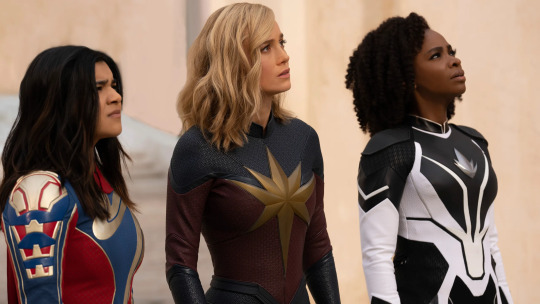
The Marvels was directed by Nia DaCosta, an award-winning Harlem native and creative visionary whose approach to this film was to define these characters as humans, not as superheroes. Her approach to heroism directly addresses that the idea that a hero is not always right. A hero, DaCosta claims, is "someone who's trying their best with the information and tools they have at the time. They'll always get it wrong." Carol Danvers's arc directly addresses this, as the resolution of her subplot involves her re-igniting the sun that she snuffed out. Her heroic act is to undo the damage that she wrought.

When compared to old Marvel, this message just doesn't come through. In WandaVision, Wanda's grief is for a family that was killed by the Avengers. Yet, she is painted as a villain, even as she searches for a happy home, even as she at one point joins the Avengers. The Avengers cannot undo what they did, and don't really try. They defeat the big bad, sacrifice their lives, but nothing brings back Wanda's family. Nothing undoes that war. No one searches for Wanda after the event, to try to help her with her grief, except for Monica, and she's working against orders. Their heroics are militant, but while they excel at destruction, they leave the people they hurt in the dust.
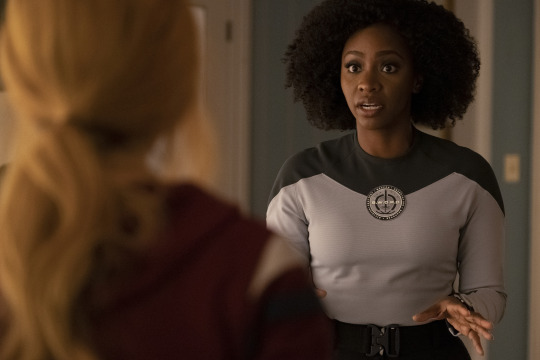
This antiheroic plot of old Marvel is precisely what appealed to so many American audiences. Their protagonists are: a rich corporation, a super-soldier, a privileged teenager, a scientist who makes weapons, an ex-convict, a man born into godlike power, and I'm sure there are others but I don't actually care that much... (these would be iron man, captain america, peter parker spiderman, hulk, antman, thor, and etc). All these archetypes appeal to American ideals that the wealthy would sympathize with. They claim that there are people who are inherently bad and seek the power that they have, in the way that a poor person might want a job that a wealthy person wants their child to secure. They claim that it is their business to save those which cannot save themselves, and use this to get involved in wars that are not theirs, and beat up badguys whose backstory they have no way of knowing-- and they punch before they stop and listen.
They are cops in every sense of the word. The responsibility of the vigilante is to defend against evil, but part of that responsibility is to figure out who exactly is evil and who is in need of help.
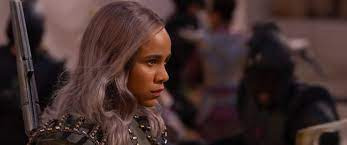
The Marvels creates a team that tries to distinguish evil from good, and delves into the grey area between them. The final battle between Carol Danvers and Dar-benn has the superhero pinning the grey-haired antagonist to the ground as she begs for, then demands, that Carol fix what she damaged. Monica urges her to listen. Through this, The Marvels argues that a hero does not always beat up the bad guy and fight against unrelenting evil, but that a hero can be wrong, and that a hero can reconsider. It's kindness in the way that is revolutionary, where it's much easier to choose cruelty.
The fact that the movie is getting torn apart by critics, then, is not just because it is a "girls movie" or it doesn't have a strong white man for the white male viewer to sympathize with. The Marvels cannot appeal to Marvel fans because it rewrites the genre itself. It takes a film series whose purpose was to depict the struggles of cops, of the wealthy, of people with too much power who are trying to learn how to responsibly wield it, but don't. And it gives that power to people who have watched superheroes try and fail, who are slowly learning to be better heroes than the ones before them.
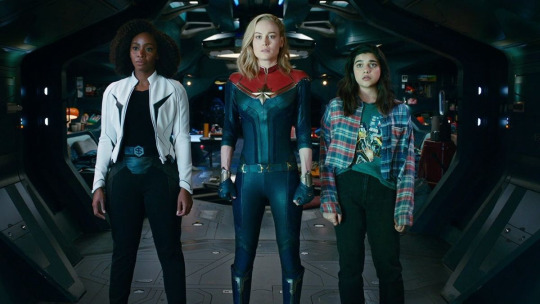
The next generation is a critique of the last, a group trying not to make the mistakes of the chosen ones that came before them, and as such, the movie exists to critique the movies that came before it. Therefore, a viewer of Marvel who would positively review it, due to sympathizing with the previous heroes and enjoying the power fantasy, would dislike it out of its existence being critical and contradictory to the films they like themselves.
The Marvels is not for Marvel fans-- at least, not those who saw the Avengers as purely heroes. Instead, the film reaches out to people who would have been against the old Avengers, who want a story that dismantles the unquestioned idealism of superheroes and writes about people trying to protect their communities and the people they care about.
So, let the critics complain. The MCU is shedding its roots as a pro-cop and pro-colonialism power fantasy, and evolving into an exploration of what it means to be a true hero.
#the marvels#ms marvel#captain marvel#photon#kamala khan#monica rambeau#carol danvers#.pyro#pyro.txt#the marvels analysis#can you tell that i loved this movie#it's been so long since i've done an analysis but this one SPOKE to me#anyways i'm coming from the perspective of a marvel hater until i watched ms marvel#honestly i just put the images in there to break it up. they are not very relevant. i didn't pirate so i don't have good screenshots
300 notes
·
View notes
Note
I'm absolutely losing it over at that Vil Sequel for Reincarnated. So I gotta ask for a sequel for Azul.
Where maybe in true manwha drama fashion the reader announces the annulment of her marriage to stick it to her fiance. And surprise, surprise Azul asks to marry them. All in front of the crowd. Double the embarrassment for the fiance.
Gotta stick it to the cheating fiance and his lovers family.

"If you are a villain, then let me be your accomplice"
feat: Azul
genre: sweet revenge
note: sequel to “being reincarnated into a new world as the bad guy”, roughly 1.3k word count, original characters were used
series masterlist
this became more of revenge fic featuring Azul and the twins because yay comeuppances!

You’ve come to realize that you are not a patient person. You were also not one to enjoy the nervous and tense looks the attendees are sending your way as you are being berated at the impromptu ball that your betrothed is hosting.
“You are an insult to nobility!” your fiance screamed as he held the baron’s daughter close to him. “To bully an innocent woman, have you no shame?”
Your eyebrow twitched at his wording. Innocent? How is a woman who chases an engaged man even considered that? And as if either of them know shame.
Thankfully the years of etiquette training drilled into this reincarnated body of yours knew how to fake a smile as the host continues to list these supposed cases of bullying.
“How could you push this sweet woman down and attack her like some brute?”
Ah, the opening you were waiting for. “Hmm? And when did I do that?”
“You still pretend to be innocent?” the male lead was seething which honestly amuses you. “Lady Neavah told me about your crimes!”
“I didn’t want to upset you, but yes” the baron’s daughter spoke through her glistening tears “On the day of Countess Charlotte’s tea party, s-she poured tea on me and pushed me down”
You glanced towards the trio you grew fond of and saw that they were not happy with the situation. While calm on the outside, you could faintly see the strained hold Jade had on his brother’s shoulder as Floyd looked ready to wring your fiance’s neck (not that you disapprove). Azul was harder to read as his hat cast a shadow over his eyes but his clenched fists hinted at his contempt. You let yourself smile at their form of concern for you but you suppose you let the two air-headed protagonists set themselves well enough for humiliation.
The heroine made a big show as she cried in your betrothed’s arms. The crowd was getting restless and whispers filled the room. That scene was meant to happen if you were to follow the original story and you would be stuttering and crying right now as well.
That is if you were to follow the original story.
“I wasn’t there, though”
“Y-Yes, you were” Neavah tried to maintain her story “You were invited as was I”
“True, I was invited. But I didn’t go” you cleared up the misinformation. “I chose to visit the Archduchess with our other acquaintances to present a gift for her future child”
The whispers grew louder at the news. To be so friendly with the Archduke family is a privilege very few could do.
“If you like, you could call upon the Archduchess to verify my attendance” you smirked when the two accusers flinched. The Archduchess is terrifying and is not one to get involved in petty scandals such as this. To call upon her is to embarrass oneself in front of the most powerful family second only to the kingdom’s ruler.
“Since you mention the topic of shame, shall I ask if you two have any”
“W-What do you mean?”
“Regardless of status or power, having an affair is considered quite distasteful, is it not?” you eyed your fiance’s arm around the baron’s daughter with a look of exhaustive annoyance. “Your relationship with Lady Neavah is quite disrespectful to me as your fiance”
“W-We’ve done nothing wrong” your fiance yelled in defense which is starting to irk you. “The lady and I are simply colleagues”
“Colleagues do not go off to eat together late at night nor do they secretly meet each other in private rooms” you snapped your fingers which called for the servants whom you ordered to hold onto the documents you brought. At your command, they handed out to the attendees of the ball “the logs of your frequent visits and patronage at these locations were recorded with a guest and typically at night when I’m at home”
Gasps and scoffs echoed throughout the ballroom as the attendees read through the logs and records of their rendezvous. You revel at the control you have on the room as your most hated characters flounder over their dirty little secret being released.
As a last ditch effort, the heroine reached out to you which you pulled back with disgust.
“Please understand,” she cried in an attempt to look sympathetic. “We are in love. We couldn’t stop from loving who we want”
You sneered at the pathetic excuse. “That “love” is not an excuse for infidelity or betrayal. You two chose to be selfish and ignore those that you hurt because it felt good to you.”
Though you held no feelings for the male lead, the previous owner of your body did. Even if you couldn’t relate to her, no one should be betrayed like this.
“Still, I’ll give you what you want. I'm annulling my engagement” you spoke with anticipated glee. With a bow for etiquette purposes only, you gave your last words to the couple “I will take my leave now”
With that, you turned to make your way to the entrance of the house. The audience parted the way for you as you confidently took each step towards your freedom.
Just then, a gloved hand came into your vision. You looked to see Azul with a satisfied grin on his lips. The gossiping crowd spoke in hushed whispers as they couldn’t believe the richest count in the kingdom was offering his hand to you.
“First, the Archduchess and now, even the Golden Count?”
“May you grant me the honor of escorting you?”
Your smile matched your business partner as you gently placed your hand on his “I accept, dear count.”
Jade and Floyd followed suit with grins on their face. Floyd had his fun snickering at the disgraced couple as the crowd looked at them with disgust in their eyes while Jade held his tongue but was happy to see that the patron logs you requested him to find were useful to you as now you owe him a favour. Ah, he meant he was happy he could help.
Before you stepped out, you recognized two familiar faces in the crowd. You saw your parents who were slack-jawed and flabbergasted at all that transpired. When they locked eyes with you, you could see the anger in their eyes. But the anger was directed towards you and not your cheating fiance.
You let out a disappointed sigh. What did you expect?
Before they could reach for you, Floyd came to your aid as he stood between you and your parents. The teal-haired man was intimidating as he stared down at your family, causing them to flinch and step back.
“Mother. Father” you called out to them. “I won’t be returning home. Don’t worry. I know my place”
After all, they were the ones that repeatedly told you that they would disown you should your engagement be broken. To the point, they wrote it in a contract as they didn’t want to deal with their useless child.
The contract which you just pulled out and waved it in their faces as you smiled one last time at them before continuing your walk to Azul’s carriage.
“What do you intend to do now?” Azul questioned with an even tone but you saw the way he fingers shook as he held nervousness over your answer.
You told Azul about your speculations on your impending annulment which was the reason you reached out to him. Now, you were quite well-off with the sum of your earnings and you have a number of supportive friends in the high social circle that you were well protected. There was no reason he could think of that you entice you to continue your companionship with him other than business relations. He has grown too fond of you to go back to how things were.
Fortunately, you ease his worries as you tightened your hold on the fair-haired man’s hand which won you a flinch and a slight flush in his cheeks, putting a genuine smile on your lips.
“I supposed I’ll just do whatever I please”
You lay your head onto the bespectacled man’s shoulder which deepen the red hue of his cheeks. You smiled as Jade and Floyd proceed to tease their old friend over his reddened complexion, thinking to yourself about the choices you made and the path you chose.
You certainly prefer this ending for yourself. And you plan of staying on this happy ending route with Azul by your side.
#twisted wonderland#twst#twisted wonderland x reader#twst x reader#twst imagines#Azul Ashengrotto#azul x reader#villainess au
1K notes
·
View notes
Note
I'm sad today because of how I know my favorite character's story must end; a tragedy I didnt recognize I was writing. Do you ever find yourself grieving any of your characters when you realize their story's end?
I don't know for sure that it comes up to the level of grief, for me. It definitely sometimes does get up to deep regret—when I'm either simply sad to be saying goodbye to a given set of characters, or regretting the end of the project that contains them: or both.
The point where the regret locks in particularly hard for me is when I find I've got no choice but to acknowledge that a story's near-completion means soon I won’t get to work/play with these characters any more. That understanding—that your active relationship as creator with the created is ending: the sound of a door in your soul closing, and the key turned, inescapably, in the lock—that can be really painful. Nor do I have any evidence that it gets any easier over time. This is just one of those "You knew the job was dangerous when you took it" kinds of thing.
But experience has taught me that there's no successfully eluding the acknowledgement of the difficulty of the upcoming ending (or its execution on the page): not if you're smart. Story is old—far, far older than any of us; and powerful. And yeah, sure, it's a privilege to be able to serve it; to be in service to it! But it's not necessarily a particularly kind taskmaster. It has its own priorities. And the (admittedly sometimes tempting) urge to try to cheat Story for one's own comfort tends not to end well. Indulging that urge means also doing a disservice to those to whom you're telling the story—which is immoral, since they came to you expecting you to get the job done right. But also, if you try bending the rules for your own sake, Story has its ways of avenging itself on you. It's best to just suffer the inevitable, sometimes-painful consequences of closure, and avoid going down that road.
Yet sometimes Story will unexpectedly reward you, too, when you've kept faith with it and resisted the temptations. I have a piece of work in hand where one of the paired protagonists is going to have to go through a long painful sequence of (literally) legendarily awful things. As a result I've been—maybe understandably—resisting writing those things, while also knowing perfectly well they're inescapable if the story's to be done justice, and if the character going through all this pain's to be correctly perfected. Which I owe to them.
Yet you can only resist for so long. A story's not worth much of anything until it's told. So I went digging through my notes to get re-grounded in the universe in question and start dealing with this situation. At which point absolutely without warning I found myself staring at a single piece of data that had been lying there among my notes since day one, right under my damn nose... and which contained the happy ending I'd been resigned to never finding for this story and these characters: along with the iron-clad rationale for it.
Impossible not to hear the immaterial Boss Of Me murmuring You're welcome... as it wandered off to let me get on with the actual hard work. Screams of Could I not have thought of this earlier?! seemed like ingratitude at that point. So I got on with it. (Admittedly with some grinning that probably left @petermorwood confused for a couple of days.)
Meanwhile, I absolutely hear your grief and pain. All I can say is, "Hang in there with it and see it through." And when it's passed over you, know that things will eventually look and feel better on the other side. :)
185 notes
·
View notes
Text
Arthur - By Poem (7.5/10)
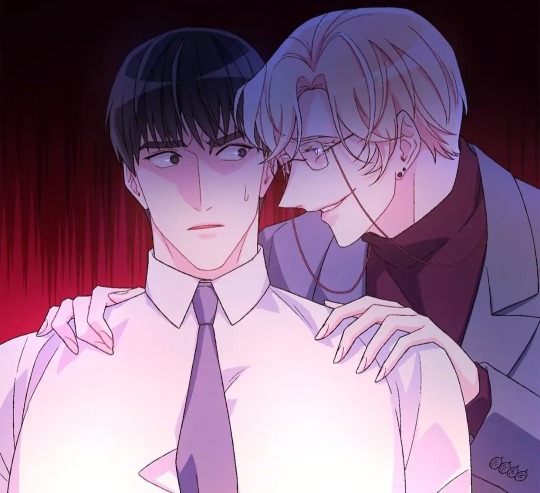
Being a good cop is a full time job and a half. Corruption. Shady security companies. Sexism. Homophobia. Stalkers. Our rookie cop protagonist has to deal with it all. His main support is an elite member of a security company. They aren't lovers. The wealthy man just wants to own and use him.
Arthur Groban is a rookie with no power and no clout. He works for the LAPD, and being a big city cop is harder. There's corruption around every corner. He can't even get basic evidence files and he has the worst luck.
His first case is a murder charge....against a senators son. The evidence is clear. The privileged man killed a homeless woman. The circumstances are disgusting, but the judge keeps throwing out the case.

Arthur gawks at a beautiful man.
The beautiful man gawks back.
Silas Moore is a wealthy adopted son. His adoptive mother owns a huge security company that often works with the FBI. He's pretty high ranking within the company, and he's known for being cold.
He also screws around with hot cops. He doesn't believe in love so he uses his high position to mess with powerful men. If you're a sexy buff cop and you want evidence that is clearly being withheld...talk to Silas Moore with your shirt off...
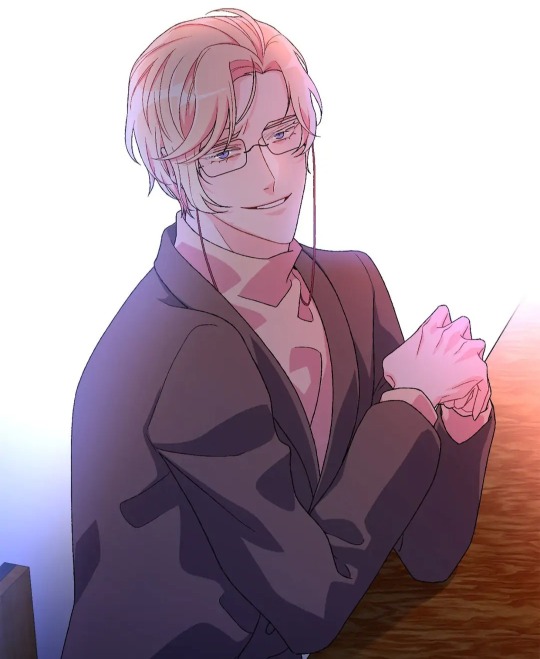
Silas propositions Arthur right away, in a way that feels suitably cold and humiliating. Silas commands Arthur like he's a dog. He snaps his fingers when he wants to hook up, and he's a pretty terrifying Dom that loves to use whips.
The homeless woman gets justice, but more high profile cases come through the door. Arthur Groban has to pay up every time to get information.

Arthur Groban is not a scared twink. He's able to regulate his emotions and mostly enjoy the hookups without any emotions involved. Silas Moore is hot. He's rich, but he has a reputation. Arthur expects nothing from him. Silas is the one that gets attached first. He starts punishing Arthur for little things. Like being distracted when they are together or trying to leave before Silas says he can go.

Arthur also runs into drama issues at worm because of Silas. Silas slept with a few elite cops who are waaayyyy above Arthur. One of them is really bitter, and it turns out that Silas is the real monster. He played with this particular cop for three years. Then he didn’t even have the decency to break it off amicably when Arthur came into the picture.
Arthur considers it a warning.
Silas Moore is not to be trusted.
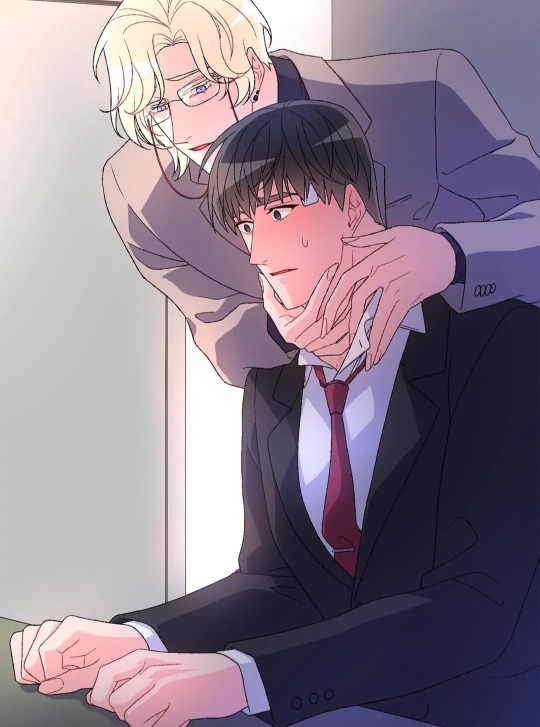
The situation escalates though. Silas starts putting in more effort. In the bedroom and the office. He's decently funny and caring too. Arthur starts to feel....affected.

Silas even meets his siblings, and he helps the family navigate a traumatizing situation.
Arthur sees more of Silas, and it looks like he's not as cold as he appears.
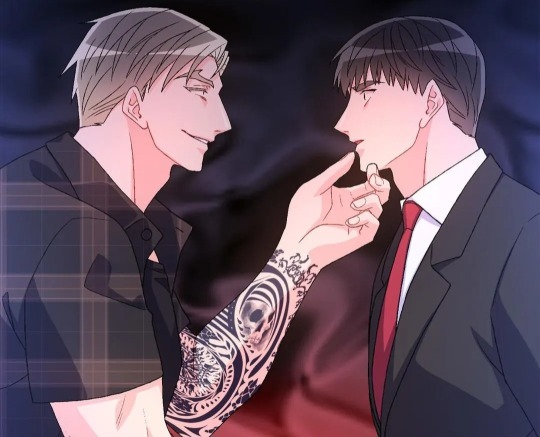
We meet the source of the problem.
Why was Silas adopted?
Well, he was raised by an abusive gangster older brother. Cain treated Silas like property and he's an extremely violent serial killer. Silas Moore is super paranoid about love and vulnerability because he was raised in a very dangerous neighborhood.
Cain decides to use Arthur to capture Silas, for unknown reasons.
Arthur decides to protect Silas. Silas protected his beloved family. It's only fair to return the favor.

Silas starts having toxic fantasies. He wants to "break" Arthur. He wants Arthur to be submissive all the time.
He doesn't act on those thoughts though, because Arthur is such a good support in his life.
They're equals.
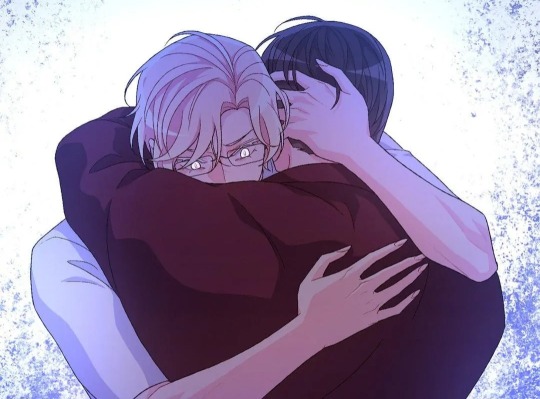
They sort of stumble into being a couple. It's very realistic? Especially compared to most BL stories. The conflict with Cain isn't super exciting though.
86 notes
·
View notes
Text
Be My Favorite, I have something important to tell you.
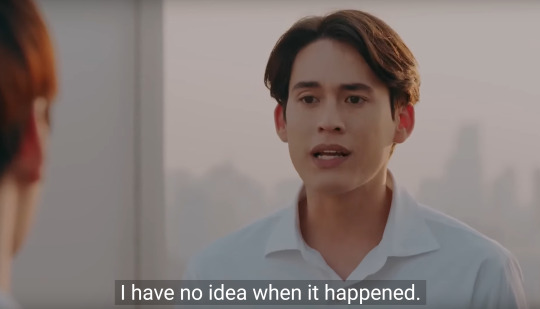

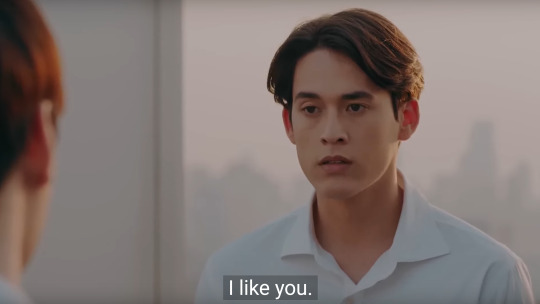
Seriously. Was it episode four that did it? Episode two? EPISODE ONE?! Or was it even earlier than that? I thought about you daily for a year and a half before you even premiered, so have I loved you all along? I DIDN'T EVEN MUTE THE SINGING! I knew as soon as Kawi was looking for a talent what the outcome would be BUT I DIDN'T PUSH MUTE!
I'm in too deep. I can't stop these feelings now. Not when you gave me this scene at the beginning of the episode where Pisaeng tells Kawi he will be honest about his feelings, and Kawi, looking so small, knows exactly what he is talking about.

Or when you gave me this ENTIRE journey of Pisaeng seeing two men kiss with the multi-colored lighting, and the multi-colored neon sign asking him to evaluate his emotions, and the safe space he lands in front of!

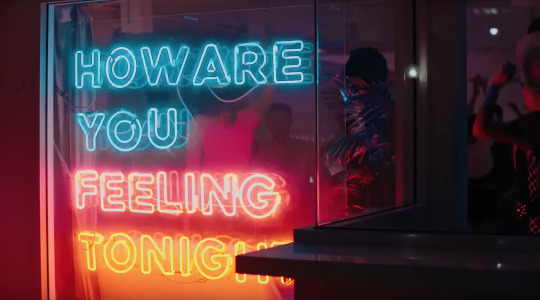

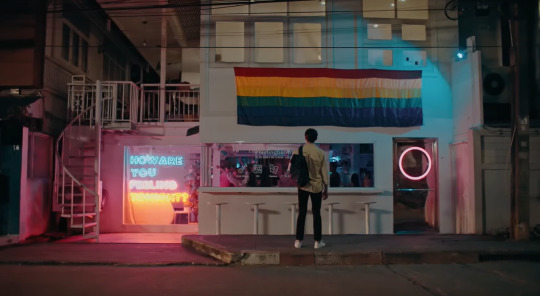
Only to have Pisaeng run away, but return in BROWN. I have a theory that Pear is peach/pink, Pisaeng is black, and Kawi is brown, so Pisaeng going back in the color of the boy who awakened these feelings in him . . . *opens up pint of ice cream and bottle of wine*
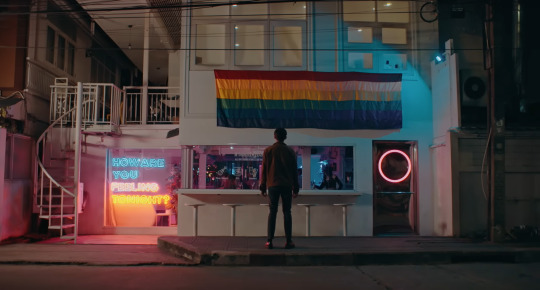
Then the fear Pisaeng had running into Max while the song in the background sang, "I'm not afraid to love"

But Piseang showing up the next day (with the closed sign sooooo appropriately placed on his body)

Because Max is the perfect friend even when he doesn't want to be. He told Kawi that everyone treats Kawi with kindness while he is kind of a dick to people, and even though he snapped at Pisaeng for thinking the world revolves around him and his issues, he course-corrected and offered a kind ear to him.

Max presents this character who is visibly queer, and to tell a straight-passing privileged boy that queerness is not a destination or a place, but an answer within ourselves is powerful. Max doesn't have to be kind to Pisaeng, but he is gentle because he realizes the struggle of being judged by appearances.

Max states that he was wrong to judge Pisaeng by his cover, and we got several books in this episode which all showed depths to the characters:
Pear had Behind the Painting - Siburapha's famous work about an arranged marriage, forbidden love, social injustice, and inequality.
Pear also has Ujjeni's book of poems The Golden Horizon, which many of the poems encourage people to keep faith against injustices and to live with an open heart.
Not of all people wrote a book that deals with love.
Kawi has 1984, a story about a society who is constantly monitored by an oppressive government and the way the protagonist actively contributes to its control by rewriting the past.
And I think Max is reading a book about gardening or cooking, but I'm unsure.





But this all leads to the overall point of this episode - Kawi's evolution. Magic won't help him find the answer. He won't find his answer in a destination or a place. The answer to how to improve his life is within him and has always been. Kawi is quick to judge everyone else, yet thinks he was unfairly judged, but the more he matures, the more he will realize HE contributed to his current situation.

Pisaeng was bothered by Not laughing when Kawi sang (he looked over at Not several times). Pisaeng invited Kawi out after their freshmen interviews, but Kawi dismissed him.


Kawi hasn't been kind. Period. He hasn't been kind to himself nor to others. Pisaeng rejected Pear with kindness. Pear rejected Kawi with kindness. But Kawi avoided Max in the past and Pisaeng because of . . . their queerness? What that would imply about him? There are several answers, but he never treated them with kindness. Not is slowly learning this lesson as well. Everyone hates his book, but the second he is shown kindness, he sends it Kawi's way.
Because the point of all of this is that magic doesn't heal people.
Kindness does.

Random sidenotes because I can't be crying in the club: I'm obsessed with this woman and her big black eyes.

And Be My Favorite hasn't faked us out once so far with these previews, so . . .

*pushes play on Fluke Gawin's OST "Unable" while I think about Kawi looking at Pisaeng at practice as he sings about the other person unexpectedly changing his life because I'm UNABLE TO STOP LOVING THIS FUCKING SHOW NOW!*
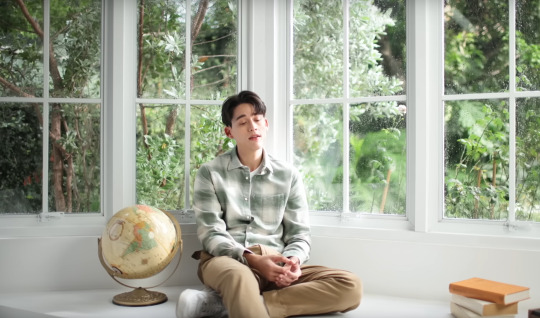
#I'm in deep#this is going to be a top for me if it keeps this up#Be My Favorite#It is my favorite!#be my favorite the series#episode 5#pisaeng x kawi#How can I love this show so much?!#When did it start?#Have I loved it forever?#This is like my bisexual awakening all over again!#I knew the feelings were there but now that they are out I can't go back
326 notes
·
View notes
Note
If you had the chance to change something about the dance of the dragons (TV show or book), what would it be? For example, how a character dies, which team a house is on,or an entire character personally. How would you change it to make the story better, in your opinion?♥️🖤💙💚
Thanks for the ask anon and sorry that it took me this long to reply. This is a tricky one and this can be long.
House of the Dragon is a complete mess and a mediocrity of a show on every level, except for the acting.
The writing is at an abysmal level, and I am convinced that it only got the interest and the rating it got thanks to the fact that it is under GoT's umbrella. And the fact that the showrunners/writers decided to be ungrateful and to insult the very show thanks to which their shitty fanfiction is even relevant, tells me everything I need to know about the arrogance and the ignorance existing behind this travesty of a show.
The showrunners/writers seem to have completely misunderstood the themes of The Dance dealing mainly with class stratification, the corruptible nature of power, the consequences of blind ambition, and the pitfalls of unchecked privilege, reducing it all to a dumbed-down and pandering fanfiction in which tokenism, outdated and bigoted caricatures, and banal depiction of sexual assault are used casually as tropes, while pretending to write a 'feminist' or a 'progressive’ show.
So, for House of the Dragon, EVERYTHING is to be changed.
Rhaenyra should have never been written as the main protagonist:
From Episode one, we already have a failure in our hand with the writing as the showrunners decided to solely use Rhaenyra as our main protagonist in a show that is supposed to depict a severe and ineluctable succession crisis at the top of the Kingdom, resulting in the splintering and in the factionalism of the ruling family. Because, at the heart of this story, this IS the main thematic of the Dance - the civil war that will be tearing the ruling family at the head of the Realm apart and, consequently, the Realm itself apart (except for Dorne which was not yet part of the Seven Kingdom).
We should have had different POVs to illustrate the deep divide that have been festering within the Targaryen clan itself and POVs from some of the closest families around them helping them rule. So, if it was me writing this, the POVs would have been:
• Alicent - for the Hightowers POV, to see things through her lends and because of the important role she will have as a Queen in the future and as the head of one of the factions.
• Rhaenyra - She will be the heir, one of the main claimants to the throne, and the head of the other main faction.
• Daemon - self-explanatory. Playing his own partition/having his own ambition and need to be in power.
• Corlys - to have a POV for the Velaryons and to highlight their side of the story and their narrative as a clan close to power. I would have made the Velaryons more politically savvy and Corlys primarily working with the sole perspective of preserving and consolidating the Velaryons' place of power/closeness to the Throne. As a whole, the Velaryons and Corlys' allegiance will clearly and only be for the Velaryon's name and clan. I would also use that POV to illustrate the Velaryons tinge of resentment towards Viserys and towards the dismissive way House Targaryen have treated them since Aemon's death.
• Criston - POV of a lower-class man of Dornish descent getting into the heart of power and having to navigates its difficulties with his set of believes and morals, and how being in the middle of all this impacts his decisions and his ambition for the ascension of House Cole to a more prominent social status.
Using Season 1 as a set-up Season and not rush with catastrophic and mismanaged times skips:
Season one should have really been a set-up season, taking the time to really put the foundations into place, while having enough belief in the story to give it the time needed to develop naturally.
I believe that it is important to pose the base that the fracture in the clan Targaryen and with the Velaryons have been created since Aemon Targaryen's death which, according to me, is truly the start of this whole succession crisis. The Dance is just the poorly managed resultant of the whole process, seeping through several generations of resentment and hatred for one another.
This will also completely negate all the stupid arguments I have seen online of 'if Viserys had married Laena, all this will not have happened'. This is because the show writers have failed the only-show fans who have no clues that the Velaryons have already threatened war during the whole Rhaenys vs Viserys ordeal. It would also emphasise the reason why it was important for Viserys to not shun the Velaryons and to keep a close alliance with them and would explain the reason why Vaemond became that adamant and not too keen on letting Rhaenyra's bastard usurp their ancestral throne. If only the Velaryons were taken seriously by the writers and not solely used as tokens and brownie points to prop-up Saint Rhaenyra?
Being aware of tokenism, bigotry and of anachronistic representations:
This show seems to have been written by people who appear completely oblivious to how careful they should have been with how to manage negative stereotypes.
Avoiding Tokenism:
From a standpoint of a Black woman like myself, the way the Velaryons were written was quite insulting. The showrunners/writers seem completely oblivious to how bad it looked to have the only House cast as Black being completely subservient, usurped and abused by their white-coded Targaryen counterparts, with no protest from most of them. The only one of them who protested – Vaemond - was villainised by the narrative and was made to say a misogynistic slur to justify his murder in open court. Murder which has no further consequence in the narrative.
These showrunners/writers seem to not understand the racial implications that this casting choice creates in this world and seem completely ignorant to how to organically integrate that change into the narration and how to prevent stereotyping those race-swapped characters, so to not reduce the Velaryons to mere tokens.
As a result, the writing made the Velaryons act like complete idiots devoid of any sense of pragmatism, strategic mindset, or political intellect, in a world that literally demands those characteristics of the people playing the game of throne. And the way Rhaenyra’s relationship to them was written also reeks of racist undertones.
Overall, the way the Velaryons were written just demonstrates the ignorance and the shallowness we have behind this show and highlights the fact that the race-swapping was only made for aesthetic purposes and for some veneer of visual racial diversity.
And the best example to illustrate that vile treatments of the Velaryons is the way Laena and her daughters were written - not that Laenor or Corlys or Vaemond were spared either - but the treatment inflicted onto those female characters, now made WoC, represent better the showrunners/writer’s deep misogynoir, to which I am sure, they are completely oblivious.
Laena's role and arc in the source material was completely butchered and diminished, by rewriting and reducing a feminine, beloved and desired (in her marriage to Daemon) woman - seduced and brazenly wanted by Daemon as his wife in F&B - into some teenager seducing the grown man Daemon, all while he only had eyes for the White girl Rhaenyra, actively feeding into the stereotypes about girls of colour growing up faster, having to be needy and desperate for men attention, and having to seek out male attention to be noticed. I mean, as if Laena was not beautiful enough for a man to notice her without her having to throw herself at him?
But it doesn't stop there. They managed to erase her relationship with Rhaenyra, reducing it all to some repulsive scenario of pitting two women against each other for a man, the complete opposite of what happened in the source material, in addition of making Laena the ‘other woman’, the lesser desired one, and the unwanted wife, in her relationship with Daemon. And let not forget the trauma-porn inflicted on her WoC body in that violent and traumatic death, which is a complete bastardisation of an invented only-show concept of “a woman dying a dragon rider death” - whatever that means.
Apparently, once Laena became mixed-race in the show, she became some thirsty, miserable, completely isolated woman, willing to go along with only being good enough as a second choice to her white husband, and dies violently by suicide instead of the beloved and cherished woman full of strength and humanity we have in her white woman depiction from F&B.
The same abhorrent treatment was inflicted onto Baela and Rhaena, both written as some wallpapers and empty headed mute dolls with no layered personalities and no real wants of their owns, just willing to go along with anything, even to their own detriment (this includes Rhaenyra’s bastards sons taking precedent over them for Driftmark), as long as it favors and bolsters the causes and the ambition of Rhaenyra - the woman their father married just few weeks after their mother's funeral.
Avoiding Bigoted depictions:
a) Some of the tokenism arguments can also be applied to the showrunners/writers’ decision to depict Ser Criston Cole as a brown man of Dornish descent, which already comes with its own in-world racial undertones, while being very hell-bent on portraying his character as an emotional, thuggish, and resentment-driven character, who got his positions as hand-me-downs from two white women, instead of the intelligent, calculated man, always in control of his emotions, and above all, driven by ambition, and who got to the highest position of knighthood in Westeros by the merits of his own competence, as he was described as in his White-coded version in F&B. This illustrates once more the showrunners/writers’ incapability of understanding the tokenistic nature of their racial representation.
Also, maybe unaware, and oblivious to their own bigotry on display in what they were implying here, the showrunners/writers went with the problematic trope of the savage, misogynist, and violent brown man for this character.
And the fact that they decided to deliberately frame this brown man as some misogynist and vindictive man, unreasonable and unjustified in his anger towards his sexual predator when he is the victim of sexual assault in that “Rhaenyra’s sexual empowerment” episode, just disgusts me. As if his feelings and the shame he felt from the whole ordeal the next day, as a person, was to be dismissed or worst, mocked.
The optics of the showrunners narratively dismissing his trauma while they have decided to change his race in the show, just highlights once more the racist undertone we have in the writing of some of the characters in this show. It also illustrates how out of touch the people behind this show are when it comes to representing power and racial dynamisms in a sensible way.
b) Larys Strong is the first disabled character we see on screen with his clubfoot and someone in the writing room though that it was a great idea to then transform him into some deviant sexual predator who gets off by fetishizing FEET. You cannot make this up!
The showrunners/writers also butchered his character by making him the confirmed and sole murderer of his father and brother, when in the books, 3 other characters, Corlys, Viserys and Daemon, were also plausible culprits for that crime - but they are all Team Black so better whitewash them all and put it all on the disabled and only Team Green character that was also under suspicions for this murder. And all to see Alicent’s feet, ladies, and gentlemen!
Instead of the enigmatic, calculated, and ambitious character we have depicted in F&B, the showrunners/writers made Larys Strong into some outdated caricature and despicable representation of a disabled character, embodiment of all of the devious and negative traits, by equating being disabled with being devious in morality and mentally. It is just a vile way to represent disabled characters, quite akin to the way they were viewed in medieval times as bearer of bad intentions/evilness, which also confirms the ableism and the hollow activism we have behind the scenes of this show.
Avoiding anachronistic representations:
a) Equating Alicent to a 'Woman for Trump' - a misogynist and reductive slur used within a very 21st century USA political discourse - while portraying a woman supposed to be within a setting mirroring medieval Europe, just shows the lack of culture, and of historical knowledge we have in this writers’ room.
b) Anachronistic girl boss characterisation: Rhaenys is written as a vessel to peddle nonsensical 21st century notions of White feminism, a hollow wannabe and anachronistic girl boss, spouting anachronistic speeches, while the show completely removed any agencies from most female characters, and took strong female characters from the original story and turned them into some victims of situations, none of their own doing of course, who constantly cry and are afraid of making any decisions, all while most of their negative traits are given to the male characters, absolute monsters and responsible for all woes that afflict the female characters.
Also, Rhaenyra is whitewashed into some girl boss and some absurd notion of a ‘modern politician’ - modern in which historical period, no one knows – who spouts drivels like ‘when I am queen, I will make a new order’, to brazenly pander to Daenerys’ fanbase, when both women are nothing alike, except for the fact that both are Targaryen women.
4. Follow the source material and not thematically rewrite the Dance:
No Aegon I prophecy or dream. Maintain the Targaryens as the ruthless colonialists they are instead of trying to justify their reason to brutally colonise a whole continent. As a person from the African continent, this is not the kind of rhetoric I would like to see peddle, justifying colonisation in the name of some superior purpose.
No white stag apparition coming to anoint our Saint Disneyesque Girlboss Rhaenyra to rule. This is insulting to the intellect of people who want to see complex storytelling.
Completely rewrite the dreadful Episode 9 and make it as close as possible to the book’s depiction of the Green Council.
No Girlboss moment for Rhaenys, murdering hundreds of peasants and ruining Aegon’s coronation.
Erasing that bullshit about Alicent confusing Viserys last words and make the Green reason to crown Aegon and Helaena based on tradition and precedents, as in F&B, and not based on some feeble concept such as the King’s word. We are not in an Absolute Monarchy here, but the uncultured idiots we have behind this show don’t even know the difference.
Not erasing fat women representation with Rhaenyra and Helaena when you claim to be such ‘feminist’ and ‘inclusive’ show. Where is the inclusion of different female body shapes? Or are they not worthy of representation? Instead, we have one of your showrunners (the incompetent Sara Hess) using fatphobic language to make it seem like it is weird for a woman’s body to evolve after several pregnancies.
Showing women on the Green side (Alicent or Helaena) going through their pregnancies and giving birth.
Not erasing Helaena in her own coronation.
Not infantilising Helaena and making her a side character in some other characters story (Aegon, Jace).
Showing the Green kids with their dragons in Season 1. As it was portrayed in HotD, most casual viewers don’t realise that in real Targaryen fashion, those kids should have their dragons around them in most official displays (side eyeing the whole dragon pit debacle here).
Where is Sunfyre and a clear view of Dreamfyre?
Making Vhagar roar when Aemond eye was slashed.
Making one of the adult correct Baela’s and Rhaena’s wrong assumption that Aemond stole Vhagar. Why did the incompetent showrunners/writers even insinuate that foolishness in the first place without having one of the adults rectify the Dragon lore? We all know that it was to paint Aemond as the villain in this situation.
Making it more evident that Rhaenyra meant torture when she said, ‘sharply questioned’.
Why was Daeron and Maelor absent?
Not making the Dragon/owner bond murkier with that shitty and useless singing session from Daemon in Episode 10, when it is canon that one rider cannot have 2 dragons at the same time to ride. Surely Daemon, as verse into Valyrian lore as they proclaim him to be, should be aware of that. This is just confusing the casual viewers.
Using Mushroom's accounts for both the Greens and the Blacks – if I am using them at all.
Not erasing Mysaria’s miscarriage as it is part of her characterisation.
Not claiming to wanting to make a 50/50 adaptation when BTS the showrunner Ryan Condal is using gobbledygook such as ‘they made Aegon usurps his sister Rhaenyra’s throne’, when, by all Westerosi tradition and precedents, Aegon could not usurp what is already lawfully his as the first-born son of the King.
For the book version of the Dance, I don’t have much to change to be honest:
I would have significantly toned down the Daemon’s fest.
I would have made the Velaryon more neutral or playing both sides, with a strategic splitting of the House to support both sides.
I would have made some of the Houses change team, like for example, making the Royces in the Vale side with the Greens, splitting the allegiances in the Vale, to better illustrate how profoundly divided the whole Realm becomes with the war of succession.
The Redwynes (which I would have made the maternal side of Alicent) and most of the Reach would have sided with the Greens.
I would have betrothed Daeron to one of the other powerful Houses in the Reach.
No Wolf Hour.
No army pulled out of nowhere in the Riverlands after Aemond reduces them to crisp. Instead, some part of the Vale army would make the bulk of it.
Finally, no Jaehaera death. That was just petty and quite stupid writing from GRRM with no logical justification as to why she needed to die. No need for the “most sexy 6 years old” to ever exist in the story.
Jaehaera and Aegon III will have their children, who mostly have no real impact on the Targaryen line anyways, apart from Daena the Defiant who gave birth to House Blackfyre.
#ask#fire and blood#asoiaf#house of the dragon#anti hotd#hotd critical#bad writing#lazy writing#team alicent#pro team green#ser criston cole#alicent hightower#pro aegon ii targaryen#aegon ii targaryen#house velaryon#laena velaryon#larys strong#ableism#shallow activism
63 notes
·
View notes
Note
Currently obsessed with the idea of Reader as a vampire 🖤 the dynamic of a literal vampire (Reader) interacting with a figurative one (Oliver) and their devotion to Felix (whom happily lets Reader feed on him)
YOUR MIND !!! I've spent the day at the beach and literally the entire time I've been thinking about this (and the other asks you've sent) !! I have so much love for the trope of someone having scary dog privileges but the scary dog seems like sunshine until they start getting protective, and I feel like this would be the exact dynamic reader and Felix have.
I also think Vampire!Reader would be bolder. In the main fic they can technically afford to be much bolder than they are, but as a vampire they don't even have to rely on their family's wealth and importance, they have their own powers to back them up. In which case, while their interpersonal dynamic with Felix would remain relatively unchanged, the way others perceive them probably would. They'd be willing to be seen and appreciated much more on their own terms and for their own accomplishments; they and Felix would be seen as two sides of the same coin, a duo of equal social standing and social pull, like dual protagonists of their friend group rather than the reader being the main supporting character to Felix. If that makes sense???
But also Oliver calling himself a vampire, but ending up so thoroughly entranced by the reader that it's almost embarrassing.
Also also Venetia calling Oliver out about his vampire comment along the lines of "you're not a vampire, just a man with good taste".
Ooft do I wanna write something proper about this AU??? Man I absolutely do!!
#head heart hand fic#felix catton x reader x oliver quick#saltburn x reader#saltburn imagine#felix catton x reader#oliver quick x reader#it shouts back
96 notes
·
View notes
Text
I think I figured out why I didn't care much for Shen Yuan as a character. It's his attitude and mindset. Didn't like how he treated SQH. It was too close to antifan behavior and cyberbullying. Even if SQH didn't seem to mind as long as he was paid.
When he transmigrated, he was nice to everyone, but being decent doesn't take much effort, and I don't think I would call SY a kind person. To me, SY is rather self-centered and callous. He was mainly concerned about himself, which is fine and understandable, but he also doesn't seem concerned with the well-being of others. He was fine with letting the story go on as intended, with LBH terrorizing the world in the future, as long as he stayed alive.
He did return to the sect when LBH attacked it, but that was when he found out that LBH didn't want to kill him. He did help stop TLJ, but he had LBH and his protagonist halo at his side. Seems to me like SY is one that as long as it doesn't affect him, he will not care what happens.
SY never once thought if he could change the story in some way even if he had to follow what the system told him to do. All he had to do when the abyss happened was say something like, "LBH you can't control your powers and I can't protect you from the sect, you need to leave and the only way to do that is the abyss because we are surrounded by cultivators". But he never even tried to think of a different way the story could go.
He doesn't really understand emotions. The scene at the end of the mausoleum, when LBH was angry that SY seemed to be running from him again, and SY had the audacity to be so upset about that. When all SY has done up to that point was run and refuse to talk to LBH. There was no understanding as to why LBH was so upset.
It seems like the only way for SY to come close to understanding LBH emotions is if he goes through LBH mind. SY does care about LBH, but he doesn't seem to be able to deeply understand LBH without going through his mind. Seems like SY can't have a conversation with LBH where they come to an important understanding with each other.
It feels like SY and LBH getting together kind of just happened. Like SY just went along with it. Also, it feels like LBH puts more effort into the relationship than SY does, LBH is the one the usually initiates. And SY never apologized to LBH for how he treated him. I think that's why I don't care much for them as a couple.
SY never cared for the fact that he took over someone else's body even when he found out the truth of SJ. While yes, SJ did horrible things, he was also an abused former slave who never got a chance to heal from his past. And SY doesn't care that he essentially erased SJ and took over his life. SJ was always pushed to the side.
SY was a privileged young master that unwillingly took over the body of a former slave and got to benefit form the work that SJ did, and SY didn't pay him any mind every when he learned the truth. SY already had everything in his former life, and because of the work SJ did, SY was in a position to get even more, and SY doesn't care. He just pushed SJ aside.
Another thing that got to me about SY is just how oblivious and dense he is. Having oblivious characters is fine to a point, but SY level of obliviousness was borderline stupidity. Even by the end, I still don't think SY knows how emotions work.
A couple of other things, his internalized homophobia is never really addressed, nor his mentality about men and women. He is rather narrow-minded, and he doesn't really change throughout the series. He constantly commits my biggest pet peeves in characters, refusal to communicate, lack of self-awareness, and denial of reality. To me, SY feels like a surface level character. Even when he does realize something, it feels surface level to me.
Overall, I think SY didn't make me feel much for him, and when he did make me feel something, it was irritation because of his attitude and mindset. SY doesn't really change much throughout the series. On the other hand, SJ and LBH made me feel for them. SJ was only in one chapter and one extra, and he made me feel more the SY ever did. I don't think LBH was in the story as much as he should have been, but when he was, he made me feel something.
I feel like the series went too fast. It went from one event to the other without much breathing room in between for the characters. And characters like SJ and, to a lesser extent, LBH, were not in the story as much as I would have liked to see. The extras did help, but it wasn't enough for me.
#svsss#shen yuan#shen jiu#luo binghe#shen qingqiu#original shen qingqiu#danmei#mxtx#scum villian self saving system#scumbag system
74 notes
·
View notes
Note
Hope you don't mind my asking but do you mind elaborating on why you don't like Mongie too much? I know all about why everyone dislikes Let's Play itself. There are various videos and post upon post online tearing it to shreds with criticism but I've not heard much about the creator herself like I do Rachel Smythe. Does she also run into the same issues that Rachel does or is her behavior different but equally questionable/annoying?
It's kinda equally questionable, kinda different. They both have the same issues of like, fetishizing youthfulness and creating unhealthy power dynamics. They also haven't done a great job at depicting POC in their comics, you can tell they're written by white women who don't understand other cultures but are trying to make their series more "progressive" by including stand-ins for representation.
That said, considering Let's Play is set in a real world setting, the POC characters (and the casually racist issues in their writing) are a lot more obvious than in LO (where you have to know the context that the neon-colored nymphs are based on POC to really realize that they're lower class POC people who are getting the shit end of the stick from the rich upper class main protagonists).
And I don't even mean in the usual "there aren't any POC in this comic" or "the POC in this comic are stereotypical/poorly written", I mean in the sort of white-victim-complex "I added in other ethnicities and people got mad at me anyways so what more do you want!" kind of way (paired with the "they're poorly written and stereotypical" aspect).
Dean is a good example of the stereotypical designing and writing, IIRC he's a Hispanic man but he's written like some Spanish soap opera character who flirts with every woman he sees and always has rose petals falling around him.
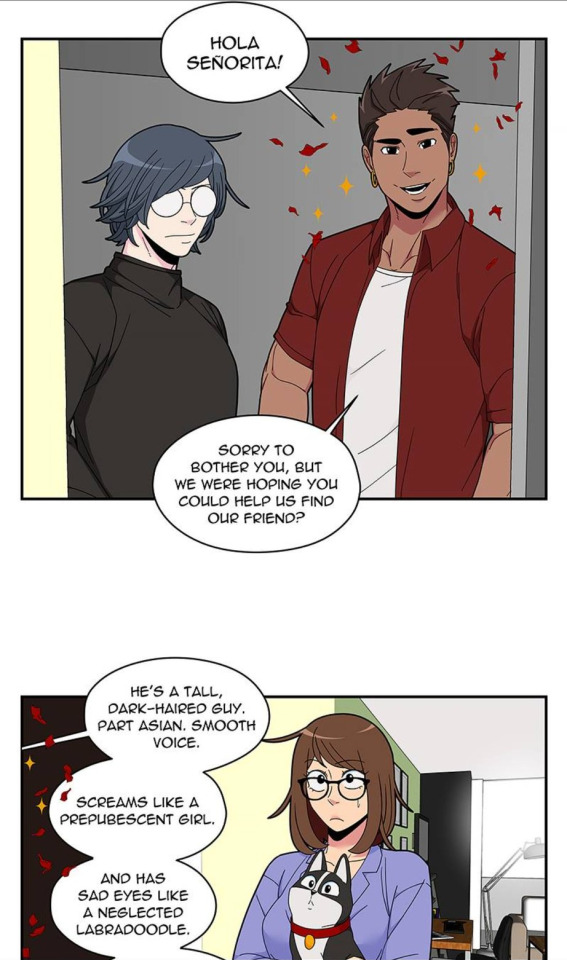
Even in that sentence he says "part Asian" which is weird because he's looking for Marshall who's supposed to be his best friend and it's been established in the comic that Marshall is half-Japanese, but that brings us to the other instance of mongie being casually (if not directly) racist and even more so than with Dean...
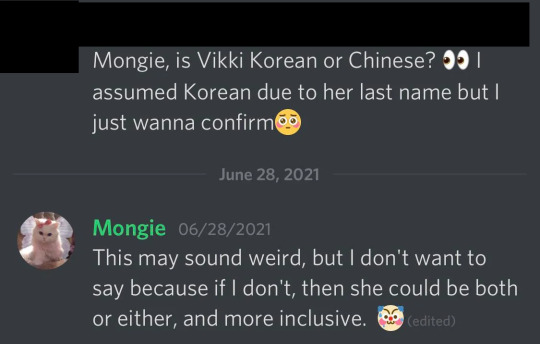
Apparently mongie thought it was a good move to say that it was "more inclusive" to make Vikki only vaguely Asian. Which is just... so not true LOL Asia is an entire continent made up of MANY different cultures and ethnicities and so generalizing all of them to just "Asian" is not a great take from someone who's trying to seem "more inclusive".
But of course, when her community called her out on this and asked her to elaborate, she and her mod team basically dug their heels in and made up excuses that made mongie out to be a victim instead of just acknowledging she made an error that didn't connect well with members of her audience.
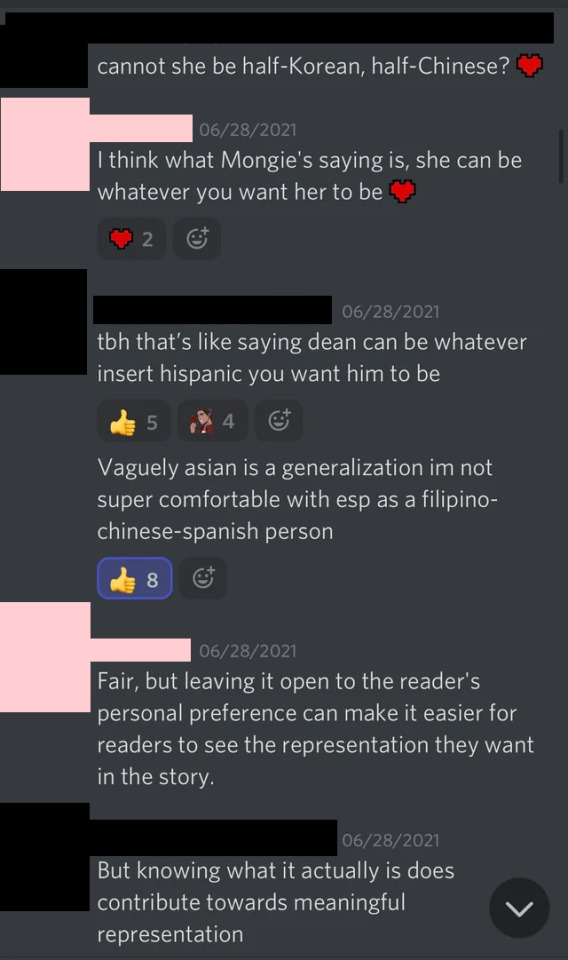
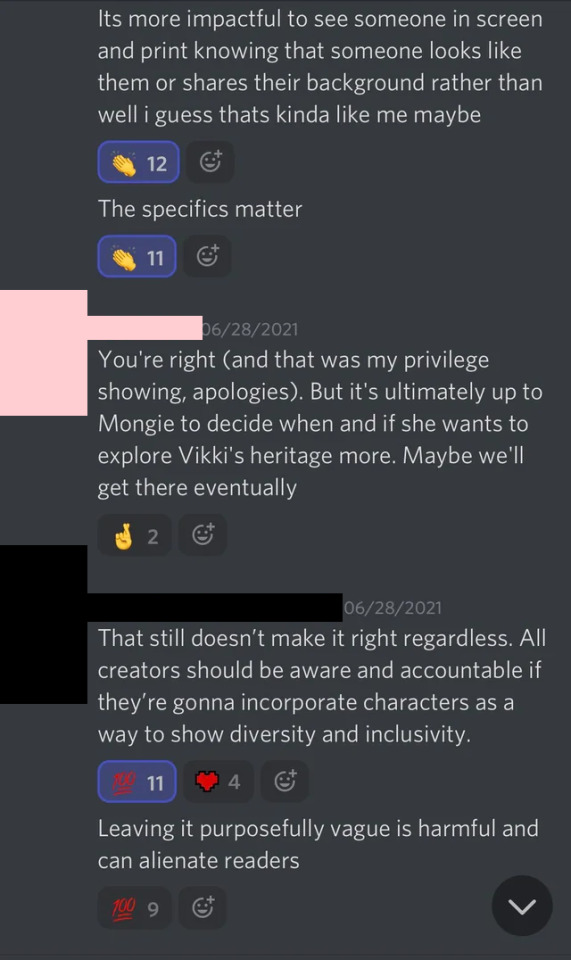
And theeen in comes mongie ready to torch the place. Note that up until this point, it's basically been her mod team speaking up on her behalf and giving her benefit of the doubt, so when mongie DID get her chance to speak, she jumped right to:
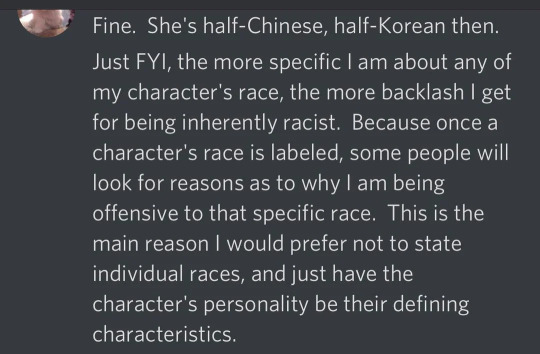
"FINE, SHE'S HALF CHINESE HALF KOREAN THEN, STFU AND STOP ANALYZING ME WHEN I INCLUDE CHARACTERS FROM RACES THAT DON'T ALIGN WITH MY OWN !!!" (╯‵□′)╯︵┻━┻ is very much the vibe people got from this, understandably so. It's also odd (and extremely privileged) for her to say that she'd "rather focus on a character's personality and not their race" because it's very "I don't see color" which has been proven to be counterintuitive to understanding and celebrating different races.
And then we get a lot of self-victimizing "well I can't win no matter what so you people are ungrateful and actually it's MY feelings that are hurt" excuses:
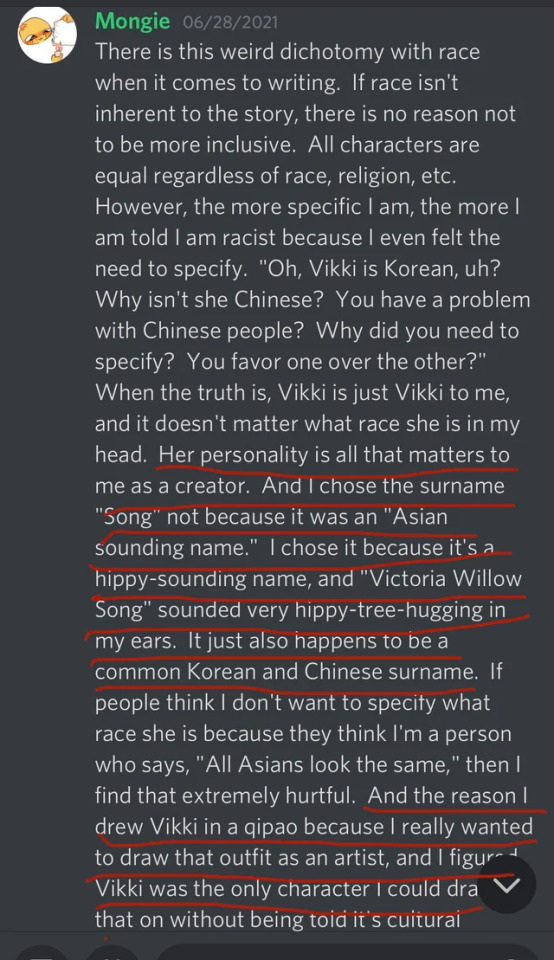
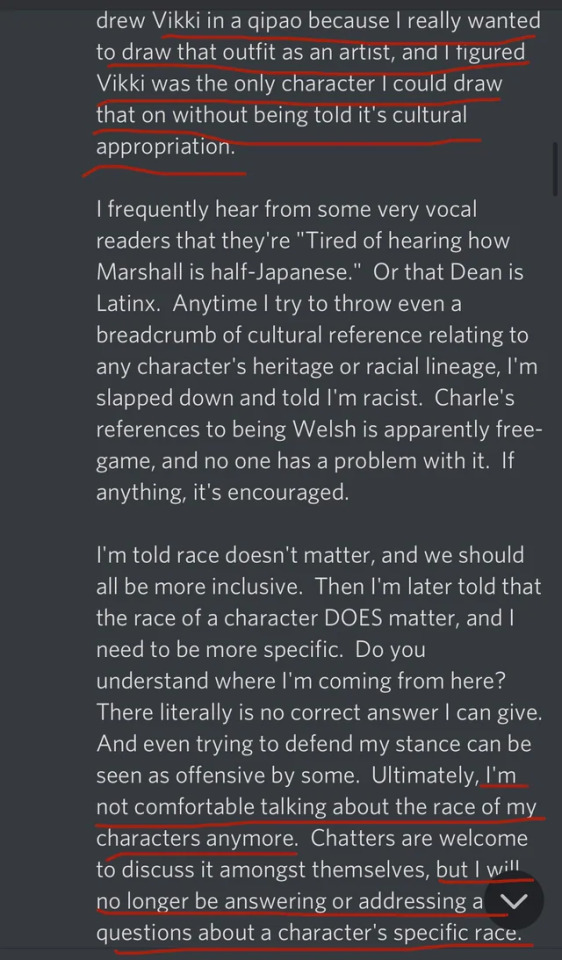
Again it's weird because she had NO problem specifying that Marshall was half-Japanese and she didn't make him into any sort of weird stereotype like she did with Vikki. So I don't know why she's having such a hard time grasping that being vaguely Asian for Vikki isn't inclusive.
Although, let's be real here, the only reason Marshall is half-Japanese at all is because he's a self-insert of Markiplier, a half-Korean Youtuber who mongie apparently worked for on payroll as a graphic designer prior to Let's Play. Which is just a whole layer of ick that I think surpasses even Rachel Smythe and Mads Mikkelson. Like the Rachel and Mads thing is definitely creepy and weird because she's literally drawn herself - an adult woman nearing her 40's - being swept off her feet by a smoochy-faced Mads. But at least she didn't work for the guy or ever interact with him directly like mongie did with Markiplier. That's a whole separate level of "ew".
That said, mongie continues:
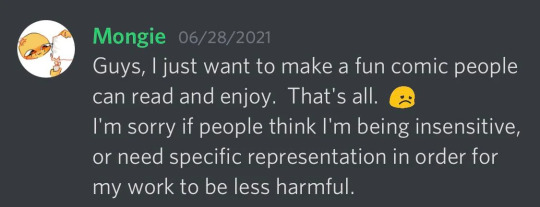
Which is just such a half-assed non-apology. Not "I'm sorry for misrepresenting a culture" or "I'm sorry I didn't do proper research", but "I'm sorry people think I'm being insensitive or that they need specific representation in my work that I'm claiming to be representation to be good". Completely shifting the blame from herself onto her audience for not being happy with the bare minimum that she gave them.
There's more though. Probably one of the worst parts and it's not even her, but one of her mods:
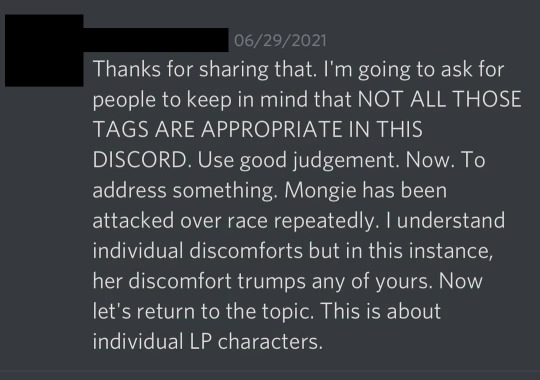
The fact that this is one of mongie's mods telling mongie's audience that her feelings - as a white woman who's just legitimately patronized her audience - are more valid than the people whose feelings were hurt by mongie being so insensitive... it's a real gross move and I can't believe they even pulled that.
Oh, and of course, as people like this tend to do, she goes on about "cancel culture" and how "terrifying" it is to her and then comes up with some imaginary scenario where a kid pays a hitman to kill her ?? as a defense for herself that really just further victimizes herself over her own misled actions ??
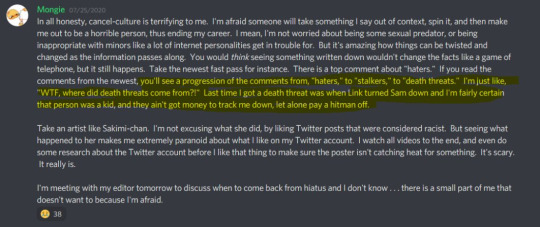
And this is something mongie does a lot, at least in this instance - she comes up with justifications for her decisions based on completely imaginary scenarios that she came up with and assumed, rather than just, idk, doing her research and being open to learning new things about cultures she's clearly not educated on. Shit like "well if I do xyz you'll be mad at me anyways so fuck you!"
When in reality? No one would have been mad at her if she didn't have any non-white characters in her comic. Would readers be disappointed? Probably. But - and I can't speak for everybody out there obviously so this is just my opinion - I know I'd much rather representation from someone who wanted to represent my respective groups and identities and put love and effort into it, than get it from someone who was just doing it because they made up a scenario in their head that they would be cancelled for not doing it. No one really has any tangible ground to stand on if they get mad at you for writing a cast of all-white characters you wanted to write, there are plenty of webtoons like that on the platform. We do need more stories that uplift and represent POC voices, but it shouldn't be from white victim complex people who only do it to virtue signal and ensure they don't get "cancelled". You know what WILL get you cancelled? Attempting to write other ethnicities and racial groups purely based on stereotypes for the sake of "representation" and then getting mad when people ask you to be a little more specific than "Asian".
Oh yeah, and then have your mods censor/delete any mentioning of educational resources regarding Asian cultures, and then essentially dox one of your community members by revealing their Twitter to the entire Discord group to boot!
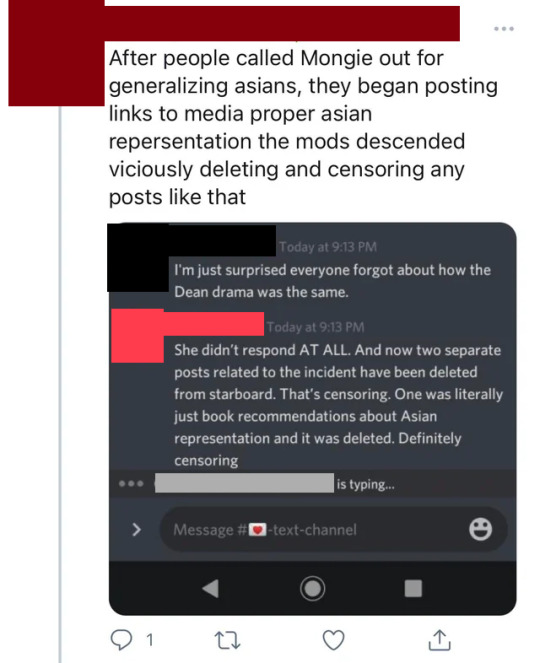
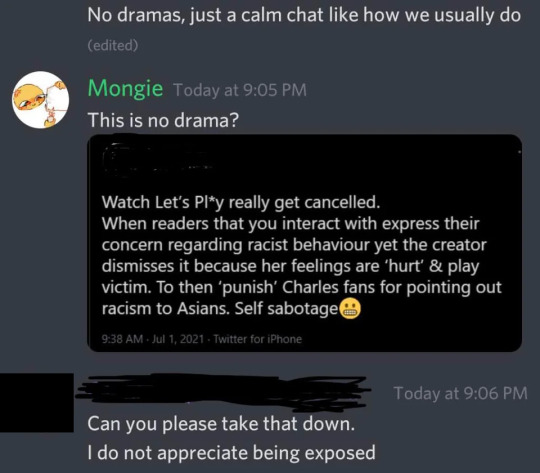
oh boy mongie, if you think THAT'S drama, wait until you see the shit I do here LMAO
#so yeah that's the tea on mongie#don't write characters outside of your own worldview if you aren't prepared to do the research#it's OKAY if you're white and only familiar with writing white characters#just don't go writing POC or other ethnicities and then acting like a martyr over it when people call you out for it being badly done#bare minimum stereotypical vague representation is just as harmful as no representation#webtoon critical#ama#ask me anything#anon ama#anon ask me anything
137 notes
·
View notes
Text
“you are a good nurse” (knives out and great men)
***(this is extremely spoilery for both knives out and glass onion. read with caution)***
In quarantine, in a smaller apartment than you might expect, Benoit Blanc is playing Among Us. This is a game—like Clue—which the celebrity detective hates. It’s too simple, too obvious, and too easy to resolve. Although he holds himself to be better than these “stupid things,” they are also a weakness—later, we will be told that he nearly failed to solve a case because it was too simple all along. For now, the gentleman sleuth is doing poorly in isolation, suffering from an all-consuming boredom which descends between cases (a trait he shares with his literary antecedents in Hercule Poirot and Sherlock Holmes). This is, all in all, a tremendous reintroduction to Blanc, the detective who, in 2019’s Knives Out, solved the murder of James PattersoHarlan Thrombey and who—in 2022’s Glass Onion—will attend a murder-mystery themed weekend getaway of the innermost circle of tech billionaire Elon MusMiles Bron. Blanc shares DNA with the classic sleuths—but he is both more and less of a hero than they were. Much of that has to do with the communities he finds himself in.
Murder mysteries have always run on high-energy casts of colorful characters—most especially in the works of Agatha Christie, whose Mousetrap, Murder on the Orient Express, and And Then There Were None feel like important steps on the road to Knives Out. Working with big tropes and cliches makes sense in a genre which is, in many ways, about developing and subverting reader expectations, and the two Knives Out films certainly build on that mold, establishing a set of stock characters drawn from the here and the now. Whether we’re dealing with a wealthy college student who sets her political beliefs aside to bow to the demands of her family (Katherine Langford as Meg Thrombey, Knives Out) or an internet micro-influencer about to explode into the mainstream screaming about the downfall of western masculinity (Dave Bautista as Duke Cody, Glass Onion), the supporting casts of both Benoit Blanc murder-flicks are fresh tropes for a fresh culture. They’re also—critically—all drawn from a particular world. Children of wealthy families, publishing executives, influencers, lifestyle models—these are people given a huge privilege, not only in the quality of their lifestyles but in the degree of their control over the direction of their lives. Although Knives Out and Glass Onion both depict circles dependent on the charity of individual, powerful men—Harlan Thrombey and Miles Bron, respectively—they are also circles made up of people who society grants decision-making power, imbuing them with the belief that they are the protagonists of life granted the god-given right to personhood in contrast to those in sidelined roles—the help, medical staff, and “Derol.”
The heroes of both films, however, are the odd ones out. They are neither the suspects (the colorful ensembles of those who “could have done it”) nor the celebrity sleuth himself (on whom everyone depends to solve the mystery and straighten things out), but rather those who are pushed to the side—assumed to be objects, not actors. Marta and Helen are the Watsons of both movies—the characters through whom we view the story, whose experiences frame and color our own (Helen takes on this role predominantly in the second half of the movie, once her true identity has been revealed to the audience). Unlike Holmes’s Watson or Poirot’s Arthur Hastings, however, these two characters are not neutral “straight characters” but individuals who suffer an active isolation, people who—however “normal” they might be in comparison to the cast—are marginalized and assumed to occupy a passive space. This positioning impacts their perspective, skewing things for viewers, reminding us that there is no apolitical way to view these events—and not to normalize the antics of the elite.
In both cases—as Marta is Harlan’s long-term nurse and Helen is dedicated to seeking justice for her sister—they are presumed to, and in many cases do, act without ego, functioning solely as objects and in the ecosystem which surrounds the powerful decision makers (Harlan Thrombey and Miles Bron) and support systems on which the protagonists of life can lean. Although the films work to counteract this assumption—reminding us of the fundamental personhood of both Helen and Marta—it is also partially through their dedication to serving others that both Helen and Marta succeed. Blanc puts this clearly in Knives Out when he reveals that he knew Marta was involved in the murder from the start: “I want you to remember something very important:” he says “You won not by playing the game Harlan's way, but yours.”
The heroes of these films do not succeed by using their invisible status to their advantage in playing “the game Harlan’s way,” getting one up on everybody by being the cleverest person in the room. Rather, they succeed by staying true to their values and doing what they know is right—even if that means sacrificing themself to the cause of another because it is right. For Marta this is attempting to save Fran—for Helen it is running out of clever ways to seek justice for her sister, and setting fire to theb building instead. By working against their own self-interest in the “game” or “puzzle” of a murder mystery, both Helen and Marta defeat their antagonists.
In Knives Out, the Thrombey family spends much of their time bickering over who really deserves to inherit Harlan’s legacy—and the film is clear that none of them can truly claim to have built success themselves, as each was granted the privilege and security of their family’s wealth. None are truly as independent—we might say, “protagonal” —as they believe. Glass Onion takes this a step further, attacking the “source” of the cycle of wealth. While Harlan Thrombey seems to have been a generally good man, a skilled storyteller, and a strong judge of character—it was his decision to reward Marta, and not his kin, with the inheritance—Glass Onion’s counterpart in Miles Bron is explicitly framed as lacking substance (being a “Glass Onion,” which appears deep but is in fact easy to see through) and having simply been in the right place in the right time to steal someone else’s work. There is no “self-made man” or “good billionaire” in Glass Onion—only people who were lucky enough to be given the opportunity to step on someone else on their way up the ladder.
This developed critique of “great men” plays directly into the events of Glass Onion’s climax. Unlike Knives Out, where the police are presented as broadly interested in justice and glad to work alongside Blanc although their investigation has already ended, Glass Onion demonstrates explicitly how systems of power—the courts and the police, but also social dynamics and community pressures—can be bent to the defense of those assumed to be powerful decision makers (like Miles Bron or Ransom Thrombey). There were allusions to this in Knives—where Ransom claims that Benoit solving the murder means nothing, since he has good lawyers and will avoid a significant sentence—but they are eventually unsubstantial, as Marta tricks Ransom into confessing in front of two officers and he is arrested as a result. When, in Glass Onion, when the only evidence to Bron’s crime is burned, Blanc himself seems to surrender, claiming that “This is where my jurisdiction ends” before leaving the room (though not before handing Helen the physical and emotional material she needs to literally burn Miles Bron’s island home to the ground). Although Helen eventually manages to set fire to the Mona Lisa—defeating Bron by ruining his public image, not through criminal prosecution—this does not seem to be her intention when she begins destroying the mansion. In this, Glass Onion seems to develop a second critique of Knives Out—not only do we come to question the validity of the narrative of “good” billionaires, we are shown that, faced with hostile powers insulating themselves within systems of law and order, the only path to justice may be working outside the law and our basic (i.e. carceral) assumptions of what “justice” is.
As the emergency services arrive to pick up a body, Benoit sits on the beach, smoking a cigar. His hands are clean, and he has inspired Helen to the heroic action that she must take. He is as smart as any Holmes, but he did not do his part in this adventure in the way Holmes would, by playing the game, solving the puzzle, and handing things over to the police. Rather, Benoit has himself taken on a supportive role—supportive to Helen, who has, in turn, taken action and found justice for her sister. He understands the limits of his jurisdiction—in other words, he knows when it is actually his turn to be the protagonist, and when it is his role to inspire others. In a world full of people who claim to have risen to power by their skill and focus, Blanc actually has remarkable skill—but he uses them, ultimately, to ends of uplifting the meek, not simply restoration of order.
461 notes
·
View notes
Text
i've shared some of Alex Freed's narrative writing advice before and i recently read another article on his website that i really liked. particularly in branching/choice-based games, a lot of people often bring up the idea of the author "punishing" the player for certain choices. i agree that this is a thing that happens, but i disagree that it's always a bad thing. i think Freed makes a good case for it here.
...acting as the player’s judge (and jury, and executioner) is in some respects the primary job of a game’s developers. Moreover, surely all art emerges from the artist’s own experiences and worldview to convey a particular set of ideas. How does all that square with avoiding being judgmental?
[...]
Let’s first dispel–briefly–the idea that any game can avoid espousing a particular worldview or moral philosophy. Say we’re developing an open world action-adventure game set in a modern-day city. The player is able to engage any non-player character in combat at any time, and now we’re forced to determine what should occur if the player kills a civilian somewhere isolated and out of sight.
Most games either:
allow this heinous act and let the player character depart without further consequence, relying on the player’s own conscience to determine the morality of the situation.
immediately send police officers after the player character, despite the lack of any in-world way for the police to be aware of the crime.
But of course neither of these results is in any way realistic. The problems in the latter example are obvious, but no less substantial than in the former case where one must wonder:
Why don’t the police investigate the murder at a later date and track down the player then?
Why doesn’t the neighborhood change, knowing there’s a vicious murderer around who’s never been caught? Why aren’t there candlelight vigils and impromptu memorials?
Why doesn’t the victim’s son grow up to become Batman?
We construct our game worlds in a way that suits the genre and moral dimensions of the story we want to tell. There’s no right answer here, but the consequences we build into a game are inherently a judgment on the player’s actions. Attempting to simulate “reality” will always fail–we must instead build a caricature of truth that suggests a broader, more realized world. Declaring “in a modern city, murderous predators can escape any and all consequences” is as bold a statement on civilization and humanity as deciding “in the long run, vengeance and justice will always be served up by the victims of crime (metaphorically by means of a bat-costumed hero).”
Knowing that, what’s the world we want to build? What are the themes and moral compass points we use to align our game?
This is a relatively easy task when working with a licensed intellectual property. In Star Trek, we know that creativity, diplomacy, and compassion are privileged above all else, and that greed and prejudice always lead to a bad end. A Star Trek story in which the protagonist freely lies, cheats, and steals without any comeuppance probably stopped being a Star Trek story somewhere along the line. Game of Thrones, on the other hand, takes a more laissez-faire approach to personal morality while emphasizing the large-scale harm done by men and women who strive for power. (No one comes away from watching Game of Thrones believing that the titular “game” is a reasonable way to run a country.)
These core ideals should affect more than your game’s storytelling–they should dovetail with your gameplay loops and systems, as well. A Star Trek farming simulator might be a fun game, but using the franchise’s key ideals to guide narrative and mechanical choices probably won’t be useful. (“Maybe we reward the player for reaching an accord with the corn?”)
Know what principles drive your game world. You’re going to need that knowledge for everything that’s coming.
[...]
Teaching the player the thematic basics of your world shouldn’t be overly difficult–low-stakes choices, examples of your world and character arcs in a microcosm, gentle words of wisdom, obviously bad advice, and so forth can all help guide the player’s expectations. You can introduce theme in a game the way you would in any medium, so we won’t dwell on that here.
You can, of course, spend a great deal of time exploring the nuances of the moral philosophy of your game world across the course of the whole game. You’ll probably want to. So why is it so important to give the player the right idea from the start?
Because you need the player to buy into the kind of story that you’re telling. To some degree, this is true even in traditional, linear narratives: if I walk into a theater expecting the romcom stylings of The Taming of the Shrew and get Romeo and Juliet instead, I’m not going to be delighted by having my expectations subverted; I’m just going to be irritated.
When you give a player a measure of control over the narrative, the player’s expectations for a certain type of story become even stronger. We’ll discuss this more in the next two points, but don’t allow your player to shoot first and ask questions later in the aforementioned Star Trek game while naively expecting the story to applaud her rogue-ish cowboy ways. Interactive narrative is a collaborative process, and the player needs to be able to make an informed decision when she chooses to drive the story in a given direction. This is the pact between player and developer: “You show me how your world works, and I’ll invest myself in it to the best of my understanding.”
[...]
In order to determine the results of any given choice, you (that is, the game you’ve designed) must judge the actor according to the dictates (intended or implicit) of the game world and story. If you’re building a game inspired by 1940s comic book Crime Does Not Pay, then in your game world, crime should probably not pay.
But if you’ve set the player’s expectations correctly and made all paths narratively satisfying, then there can be no bad choices on the part of the player–only bad choices on the part of the player character which the player has decided to explore. The player is no more complicit in the (nonexistent) crimes of the player character than an author is complicit in the crimes of her characters. Therefore, there is no reason to attempt to punish or shame the player for “bad” decisions–the player made those decisions to explore the consequences with you, the designer. (Punishing the player character is just dandy, so long as it’s an engaging experience.)
[...]
It’s okay to explore difficult themes without offering up a “correct” answer. It’s okay to let players try out deeds and consequences and decide for themselves what it all means. But don’t forget that the game is rigged. [...]
Intentionally or not, a game judges and a game teaches. It shows, through a multiplicity of possibilities, what might happen if the player does X or Y, and the player learns the unseen rules that underlie your world. Embracing the didactic elements of your work doesn’t mean slapping the player’s wrist every time she’s wrong–it means building a game where the player can play and learn and experiment within the boundaries of the lesson.
#every choice you make while designing your game says something about your experiences and your world view#whether you think it does or not#i think abt that interview with hozier where he talks abt all art being political & someone in the comments tried to disagree#by saying a child's drawing of their house cant possibly be political & someone else replies:#but it is. what does a house look like to them? is it one story or two? is it a trailer? an apartment? these things imply something#about that child's lived experience#another post i reblogged on kithj that talked abt these games like the forest or far cry where you play as a random white guy#that is being hunted by the evil native people. and the game requires you to just indiscriminately kill them#without thinking about it bc it's a game and you're the protag. that says something whether it was intentional or not#allowing the player character to do or say certain things without consequences communicates something to the player!!!#this does not mean you should punish them but that you should think about your narrative design and your choices and their outcomes#think about what makes sense in your world#and think about what it could imply in the real world. to the player#and think about all the different paths you can explore with them in this way#writing
70 notes
·
View notes
Text
spoilers for ep7 below the cut, beware that I discuss power balances, abuse and assault with book spoilers. I mostly discuss siuan, moiraine, rand, lan and elaida.
sooo much discourse about siuan and it’s personally very disturbing that people think it’s alright for the show to radically deviate from her established characterisation* (1. which is specifically, purposefully IN CONTRAST to elaida in the books 2. violates its own canon about siuan trusting Dreams, foretellings and prophecies wrt to the dragon more fervently than moiraine herself) or that she was reaping the consequences of her actions when she was deposed in tsr, ignoring how siuan isn’t unique in keeping secrets as an aes sedai or how gawyn and galad are intentionally treated like spoiled, privileged children who think they’re cleverer than they really are when they act without considering the consequences of their actions or how the books frame the whole sequence as a tragedy of errors on all sides. I’m pretty sure @/amemoryofwot made the breakdown on the black ajah to non black ajah sisters in the hall and it was very revelatory about the exact significance of the stakes set up against siuan. I also think it’s important to not ignore the gender dimension involved in the way people approach rand and mat as opposed to moiraine or egwene or siuan - male characters are always better tolerated when they make morally questionable choices while women are systemically taken apart and derided for being foolish.
that said. it’s very telling that the show is solely interested in moiraine almost to a fault; we’ve had 5 different expositions with significant screentime about moiraine pushing people away from alanna, anvaere and verin - and at some point it just becomes very bad writing. viewers are not juvenile. they don’t need to be rapped over the head over a concept that the show catches and chooses to explore.
this analysis segues into another conversation that we should be having - I do understand that framing lan and siuan in context of their relationships to moiraine as the protagonist of the series is inevitable, smart writing. but after laying the foundation for their characters in s1 and establishing their motivations there was absolutely no need to continue to frame them in context of their relationship to moiraine almost to the exclusion of all other facets of their characterisations. liandrin was clearly afforded a lot more generous writing and screentime and it’s a Problem and also very bad writing when an antagonist is afforded more screentime than your ACTUAL PROTAGONISTS. some of these writing choices are really racist, period.
with regards to discussions about assault and abuse in this episode I will say this once, and only once:
moiraine transferring lan’s bond to myrelle in the books was an act of desperation undertaken only because lan’s life was at stake. moiraine ACTUALLY asking alanna to forcibly take lan’s bond is akin to threatening him with assault. it’s bad writing meant to make her seem a lot more colder to justify the intervention that we see later on. lan offering an apology to moiraine at the end of the episode without any apology in turn displays the writers’ sheer lack of sensitivity in handling the whole conversation.
the show using the oath rod flippantly is another angle that really boils my blood because it clearly would’ve enabled worser amyrlins to exercise power with impunity. ELAIDA was famously the amyrlin who wanted to extract oaths of allegiance from her sisters.
ELAIDA was also famously the amyrlin who gave orders to have rand transported to the tower so that she could use him as a weapon and deny him any agency. the tower *has* no rules for dealing with the dragon in the books and the show chose to manufacture it to no real benefit except awkward, badly executed conflict. siuan and moiraine may have often attempted to control rand in the books - and they were at least partly right sometimes because they had more worldly knowledge and experience than he did - but it’s important to the story that they choose not to deny him his agency and give him plenty of leeway and that elaida specifically thinks of him only as a tool. rand also being physically restrained by the shielding weave and possibly sleeping in that position uncomfortably reminds me of the box sequence in lord of chaos.
siuan compelling moiraine to follow her orders, as a partner she’s been intimate with, is akin to assault. rosamund pike made very specific acting choices that are jarring and difficult to ignore. moiraine gave that oath to siuan in 1x06 implicitly trusting her with her bodily and psychological wellbeing and siuan specifically chooses to violate it. it’s a step away from using the weave for compulsion (which is explicitly also stated as being forbidden btw!)
rand’s scenes when he’s shielded by siuan being juxtaposed against egwene’s scenes with renna was a very bad choice and the editing was so fucking awkward. if the choice was intentionally meant to generate conversations about autonomy it was a very bad one to make.
you know what the kicker is? lan’s exposition to nynaeve about the damane deserving to be free in WH (or was it CoT or KoD? I don’t remember very well) because it was every human’s right despite the harm that they might be capable of causing explicitly positions ELAIDA as a bad person. what does it say about siuan after this episode? any person able to wilfully participate in taking away another person’s autonomy is not a good person, full stop.
theories about siuan being under compulsion (by liandrin) are. fine. it doesn’t explain the showrunners basically speaking from moiraine’s perspective of the tragic turn that the romance took or ignorantly comparing it to the kind of assault ishamael performed on moiraine without any selfawareness or the disconnect in liandrin apparently trying to get rand back in the tower because lanfear and ishamael clearly want him in falme but whatever (unless speculation that another forsaken is free is true). I won’t dismiss it right now, but I don’t think they’re correct. there’s enough clues in the show to make it a plausible theory, but not necessarily a probable one - and it doesn’t explain siuan’s faith in her judgement about treating rand like weapon earlier in the episode.
I’m just…. lol. exasperated. I’m indifferent to her but there’s a very obvious sense of people condemning tuon for being a horrible person in the fandom - and like yeah she IS a horrible person but that’s still textually acknowledged. what is also textually acknowledged is the difficult process involved in deprograming people. when your show can’t understand the textbook definition of assault I’m a lot more unlikely to trust the showrunners actually!
*characters like ishamael, lanfear and min obviously needed overhauling because they were very badly done but their fundamental, core characterisations and motives still remain intact so they work. siuan and lan aren’t even afforded the grace of well-considered changes to their characterisations.
#not that I’ve tagging book spoilers before. sorry I’m exhausted by the thought of using an extensive number of tags.#text#this isn’t well organised but I had to say my piece 👍 leave siuan alone or die by my blade. she deserved none of that.#wheel of time
77 notes
·
View notes